
LMeterX
Professional Load Testing for Any LLM Services or Routers. 大模型推理服务压测工具,性能测试结果AI分析
Stars: 59
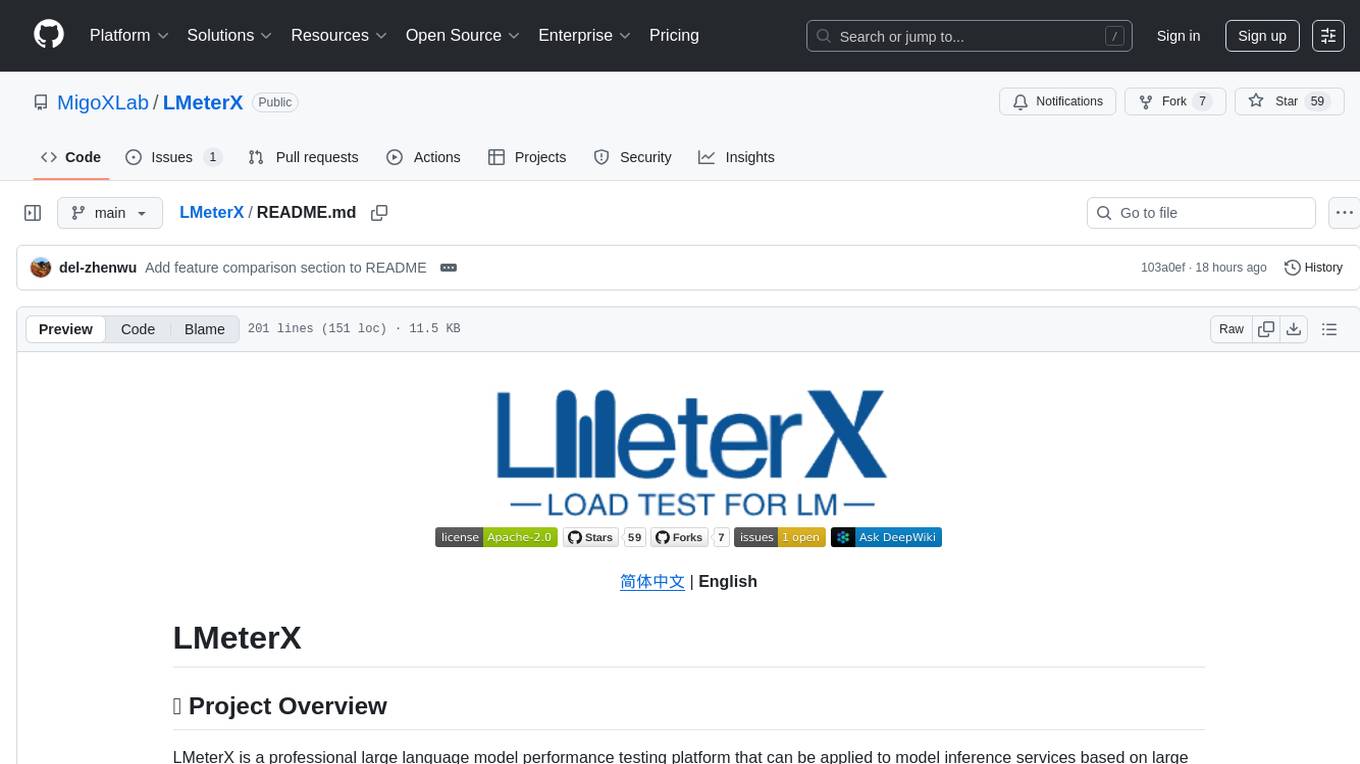
LMeterX is a professional large language model performance testing platform that supports model inference services based on large model inference frameworks and cloud services. It provides an intuitive Web interface for creating and managing test tasks, monitoring testing processes, and obtaining detailed performance analysis reports to support model deployment and optimization.
README:
LMeterX is a professional large language model performance testing platform that can be applied to model inference services based on large model inference frameworks (such as LiteLLM, vLLM, TensorRT-LLM, LMDeploy, and others), and also supports performance testing for cloud services like Azure OpenAI, AWS Bedrock, Google Vertex AI, and other major cloud providers. Through an intuitive Web interface, users can easily create and manage test tasks, monitor testing processes in real-time, and obtain detailed performance analysis reports, providing reliable data support for model deployment and performance optimization.
- Universal Framework Support - Compatible with mainstream inference frameworks (vLLM, LiteLLM, TensorRT-LLM) and cloud services (Azure, AWS, Google Cloud)
- Full Model Compatibility - Supports mainstream LLMs like GPT, Claude, and Llama with one-click stress testing
- High-Load Stress Testing - Simulates high-concurrency requests to accurately detect model performance limits
-
Multi-Scenario Coverage - Supports streaming/non-streaming, supports text/multimodal/custom datasets
- Professional Metrics - Core performance metrics including first token latency, throughput(RPS、TPS), and success rate
-
AI Smart Reports - AI-powered performance analysis
, multi-dimensional model comparison and visualization
- Web Console - One-stop management for task creation, stopping, status tracking, and full-chain log monitoring
- Enterprise-level Deployment - Docker containerization with elastic scaling and distributed deployment support
| Dimension | LMeterX | EvalScope | llmperf |
|---|---|---|---|
| Usage | Web UI for full-lifecycle task creation, monitoring & stop (load-test) | CLI for ModelScope ecosystem (eval & load-test) | CLI, Ray-based (load-test) |
| Concurrency & Stress | Multi-process / multi-task, enterprise-scale load testing | Command-line concurrency (--parallel, --rate) |
Command-line concurrency |
| Test Report | Multi-model / multi-version comparison, AI analysis, visual dashboard | Basic report + visual charts (requires gradio, plotly, etc.) | Simple report |
| Model & Data Support | OpenAI-compatible, custom data & model interfaces | OpenAI-compatible by default; extending APIs needs custom code | OpenAI-compatible |
| Deployment & Scaling | Docker / K8s ready, easy horizontal scaling |
pip install or source code |
Source code only |
LMeterX adopts a microservices architecture design, consisting of four core components:
- Backend Service: FastAPI-based REST API service responsible for task management and result storage
- Load Testing Engine: Locust-based load testing engine that executes actual performance testing tasks
- Frontend Interface: Modern Web interface based on React + TypeScript + Ant Design
- MySQL Database: Stores test tasks, result data, and configuration information
- Docker 20.10.0+
- Docker Compose 2.0.0+
- At least 4GB available memory
- At least 5GB available disk space
Complete Deployment Guide: See Complete Deployment Guide for detailed instructions on all deployment methods
Use pre-built Docker images to start all services with one click:
# Download and run one-click deployment script
curl -fsSL https://raw.githubusercontent.com/MigoXLab/LMeterX/main/quick-start.sh | bash# Download the deployment file docker-compose.yml
curl -fsSL -o docker-compose.yml https://raw.githubusercontent.com/MigoXLab/LMeterX/main/docker-compose.yml
# Start multiple instances using the --scale
# Start 2 backends + 2 engines (the number can be adjusted as needed)
docker compose up -d --scale backend=2 --scale engine=2- Access Web Interface: Open http://localhost:8080
-
Create Test Task: Navigate to Test Tasks → Create Task, configure LLM API request information, test data, and request-response field mapping
- 2.1 Basic Information: For
/chat/completionsAPI, you only need to configure API path, model, and response mode. You can also supplement the complete payload in request parameters. - 2.2 Data Payload: Select built-in text datasets/multimodal datasets as needed, or upload custom JSONL data files.
- 2.3 Field Mapping: Configure the prompt field path in payload, and response data paths for model output content, reasoning_content fields, usage fields, etc. This field mapping is crucial for updating request parameters with datasets and correctly parsing streaming/non-streaming responses.
- 2.1 Basic Information: For
- API Testing: In Test Tasks → Create Task, click the "Test" button in the Basic Information panel to quickly test API connectivity Note: For quick API response, it's recommended to use simple prompts when testing API connectivity.
- Real-time Monitoring: Navigate to Test Tasks → Logs/Monitoring Center to view full-chain test logs and troubleshoot exceptions
- Result Analysis: Navigate to Test Tasks → Results to view detailed performance results and export reports
- Result Comparison: Navigate to Model Arena to select multiple models or versions for multi-dimensional performance comparison
- AI Analysis: In Test Tasks → Results/Model Arena, after configuring AI analysis service, support intelligent performance evaluation for single/multiple tasks
# ================= Database Configuration =================
DB_HOST=mysql # Database host (container name or IP)
DB_PORT=3306 # Database port
DB_USER=lmeterx # Database username
DB_PASSWORD=lmeterx_password # Database password (use secrets management in production)
DB_NAME=lmeterx # Database name
# ================= Frontend Configuration =================
VITE_API_BASE_URL=/api # Base API URL for frontend requests (supports reverse proxy)
# ================= High-Concurrency Load Testing Deployment Requirements =================
# When concurrent users exceed this threshold, the system will automatically enable multi-process mode (requires multi-core CPU support)
MULTIPROCESS_THRESHOLD=1000
# Minimum number of concurrent users each child process should handle (prevents excessive processes and resource waste)
MIN_USERS_PER_PROCESS=600
# ⚠️ IMPORTANT NOTES:
# - When concurrency ≥ 1000, enabling multi-process mode is strongly recommended for performance.
# - Multi-process mode requires multi-core CPU resources — ensure your deployment environment meets these requirements.
# ================= Deployment Resource Limits =================
deploy:
resources:
limits:
cpus: '2.0' # Recommended minimum: 2 CPU cores (4+ cores recommended for high-concurrency scenarios)
memory: 2G # Memory limit — adjust based on actual load (minimum recommended: 2G)
We welcome all forms of contributions! Please read our Contributing Guide for details.
LMeterX adopts a modern technology stack to ensure system reliability and maintainability:
- Backend Service: Python + FastAPI + SQLAlchemy + MySQL
- Load Testing Engine: Python + Locust + Custom Extensions
- Frontend Interface: React + TypeScript + Ant Design + Vite
- Deployment & Operations: Docker + Docker Compose + Nginx
LMeterX/
├── backend/ # Backend service
├── st_engine/ # Load testing engine service
├── frontend/ # Frontend service
├── docs/ # Documentation directory
├── docker-compose.yml # Docker Compose configuration
├── Makefile # Run complete code checks
├── README.md # English README
- Fork the Project to your GitHub account
- Clone Your Fork, create a development branch for development
- Follow Code Standards, use clear commit messages (follow conventional commit standards)
-
Run Code Checks: Before submitting PR, ensure code checks, formatting, and tests all pass, you can run
make all - Write Clear Documentation: Write corresponding documentation for new features or changes
- Actively Participate in Review: Actively respond to feedback during the review process
- [ ] Support for client resource monitoring
- [ ] CLI command-line tool
- [ ] Support for
/v1/embeddingand/v1/rerankAPI stress testing
- Deployment Guide - Detailed deployment instructions and configuration guide
- Contributing Guide - How to participate in project development and contribute code
Thanks to all developers who have contributed to the LMeterX project:
- @LuckyYC - Project maintainer & Core developer
- @del-zhenwu - Core developer
This project is licensed under the Apache 2.0 License.
For Tasks:
Click tags to check more tools for each tasksFor Jobs:
Alternative AI tools for LMeterX
Similar Open Source Tools

LMeterX
LMeterX is a professional large language model performance testing platform that supports model inference services based on large model inference frameworks and cloud services. It provides an intuitive Web interface for creating and managing test tasks, monitoring testing processes, and obtaining detailed performance analysis reports to support model deployment and optimization.
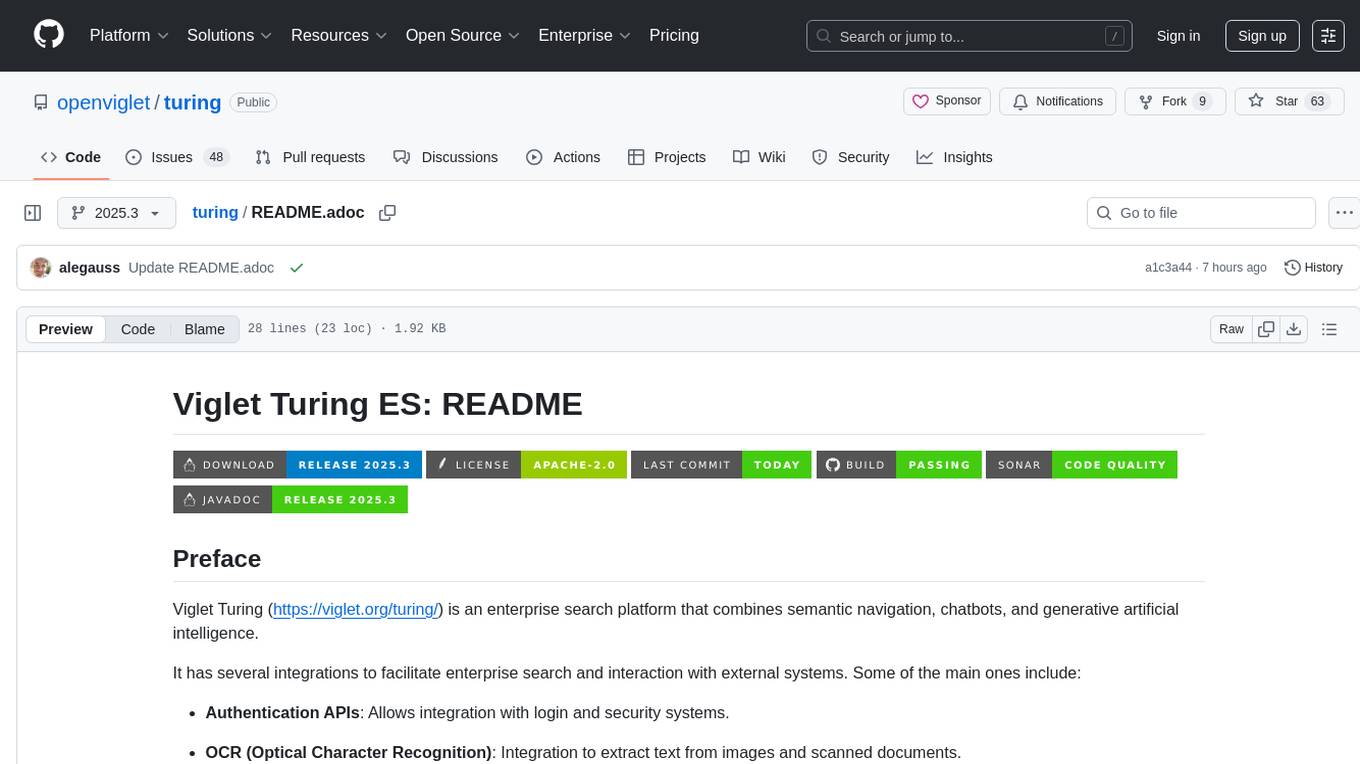
turing
Viglet Turing is an enterprise search platform that combines semantic navigation, chatbots, and generative artificial intelligence. It offers integrations for authentication APIs, OCR, content indexing, CMS connectors, web crawling, database connectors, and file system indexing.
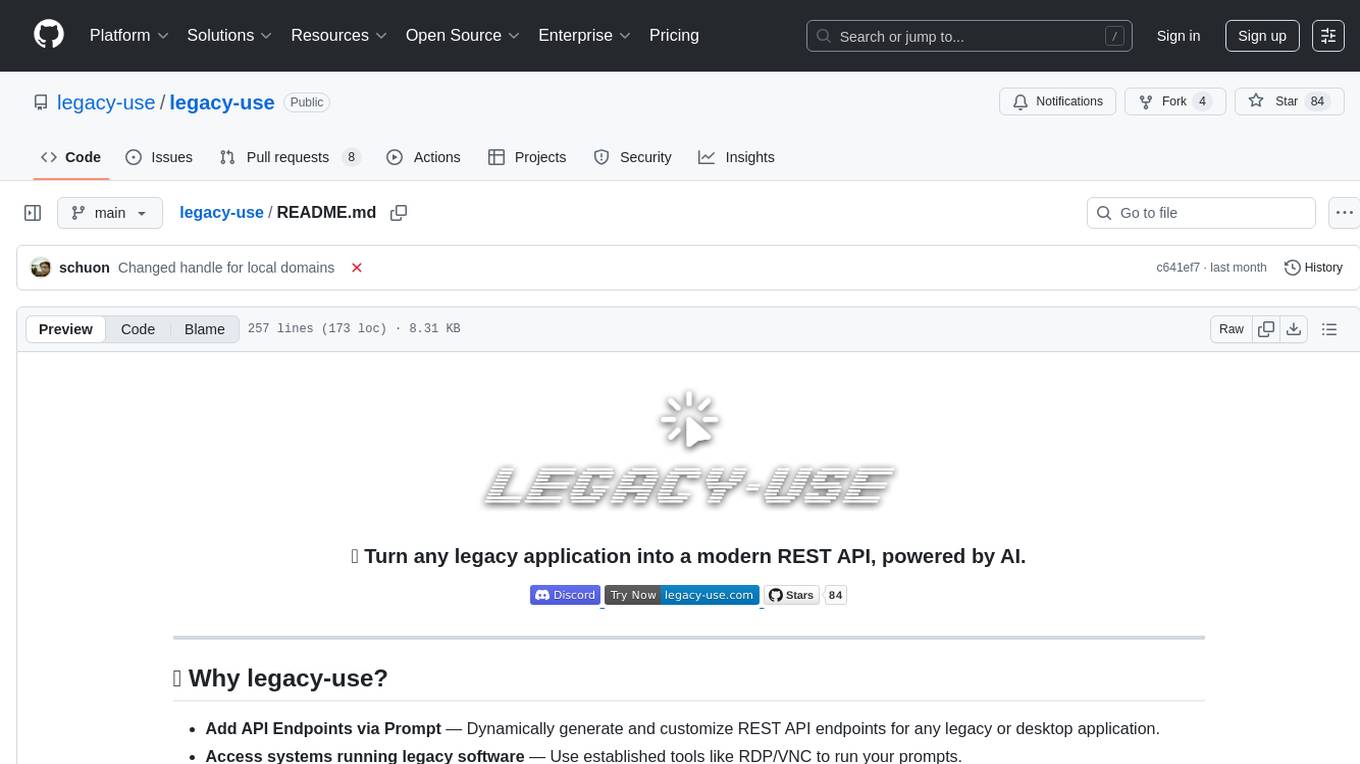
legacy-use
Legacy-use is a tool that transforms legacy applications into modern REST APIs using AI. It allows users to dynamically generate and customize API endpoints for legacy or desktop applications, access systems running legacy software, track and resolve issues with built-in observability tools, ensure secure and compliant automation, choose model providers independently, and deploy with enterprise-grade security and compliance. The tool provides a quick setup process, automatic API key generation, and supports Windows VM automation. It offers a user-friendly interface for adding targets, running jobs, and writing effective prompts. Legacy-use also supports various connectivity technologies like OpenVPN, Tailscale, WireGuard, VNC, RDP, and TeamViewer. Telemetry data is collected anonymously to improve the product, and users can opt-out of tracking. Optional configurations include enabling OpenVPN target creation and displaying backend endpoints documentation. Contributions to the project are welcome.
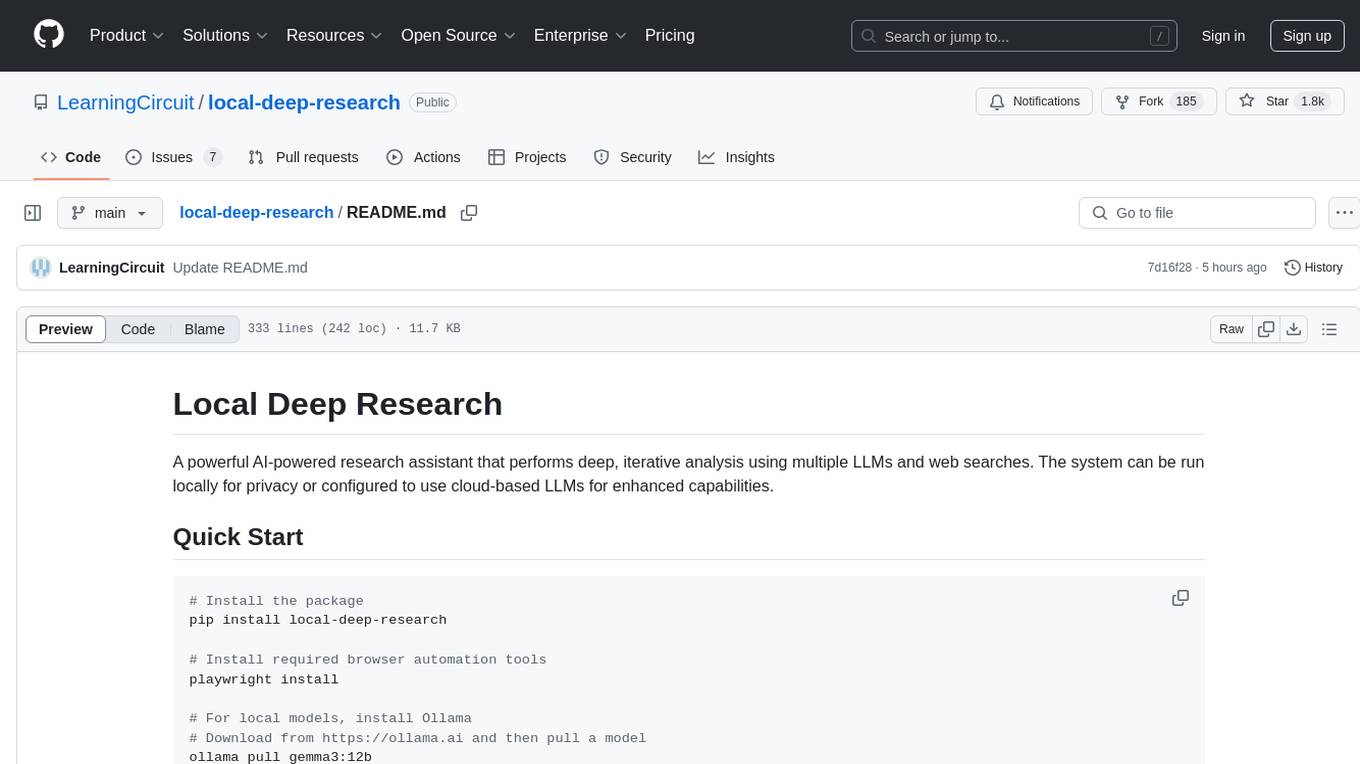
local-deep-research
Local Deep Research is a powerful AI-powered research assistant that performs deep, iterative analysis using multiple LLMs and web searches. It can be run locally for privacy or configured to use cloud-based LLMs for enhanced capabilities. The tool offers advanced research capabilities, flexible LLM support, rich output options, privacy-focused operation, enhanced search integration, and academic & scientific integration. It also provides a web interface, command line interface, and supports multiple LLM providers and search engines. Users can configure AI models, search engines, and research parameters for customized research experiences.
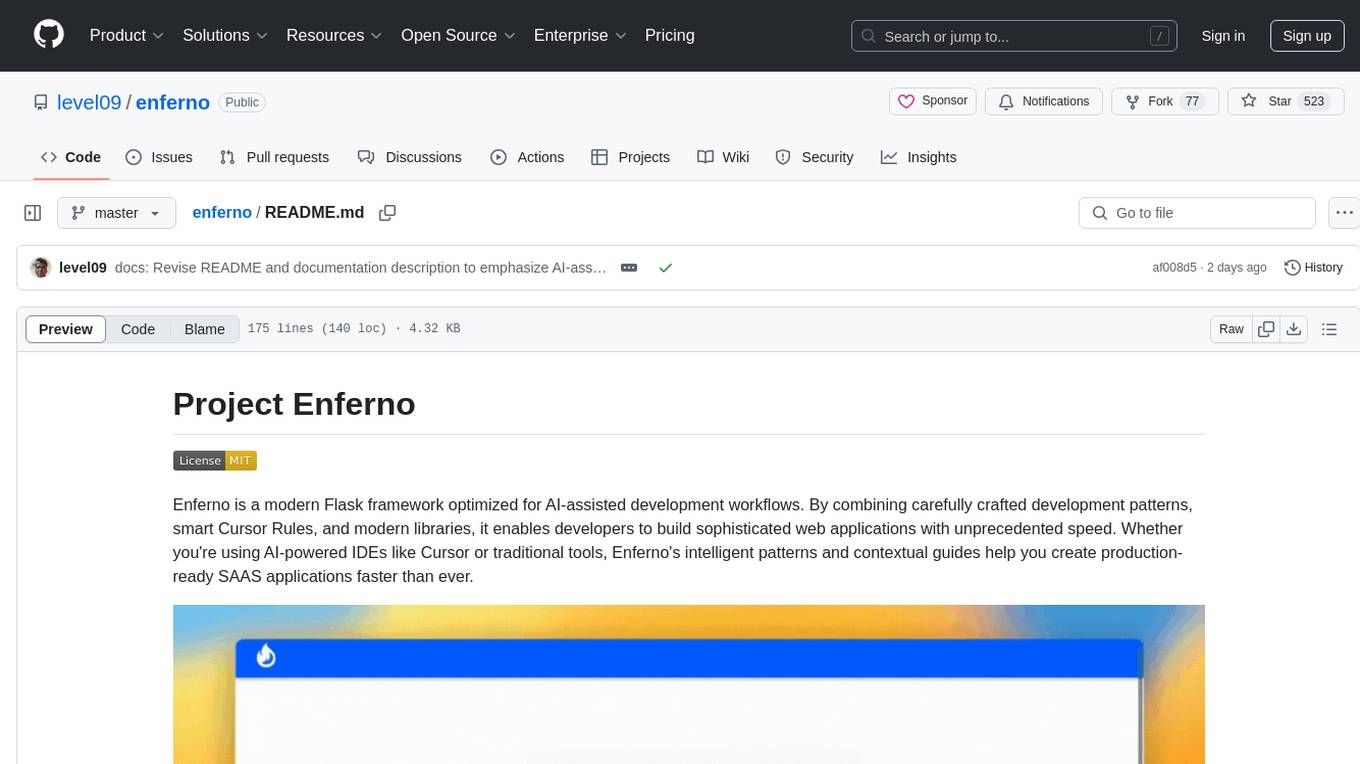
enferno
Enferno is a modern Flask framework optimized for AI-assisted development workflows. It combines carefully crafted development patterns, smart Cursor Rules, and modern libraries to enable developers to build sophisticated web applications with unprecedented speed. Enferno's intelligent patterns and contextual guides help create production-ready SAAS applications faster than ever. It includes features like modern stack, authentication, OAuth integration, database support, task queue, frontend components, security measures, Docker readiness, and more.
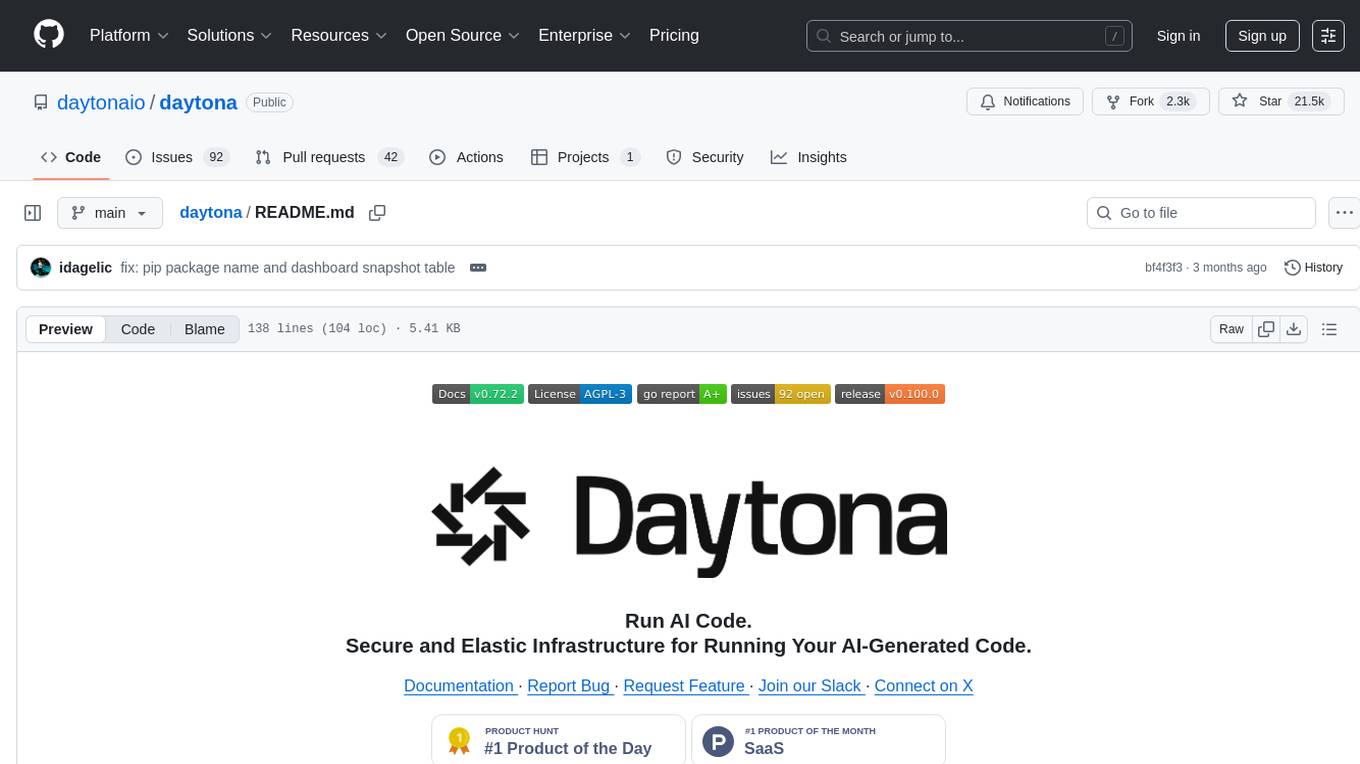
daytona
Daytona is a secure and elastic infrastructure tool designed for running AI-generated code. It offers lightning-fast infrastructure with sub-90ms sandbox creation, separated and isolated runtime for executing AI code with zero risk, massive parallelization for concurrent AI workflows, programmatic control through various APIs, unlimited sandbox persistence, and OCI/Docker compatibility. Users can create sandboxes using Python or TypeScript SDKs, run code securely inside the sandbox, and clean up the sandbox after execution. Daytona is open source under the GNU Affero General Public License and welcomes contributions from developers.
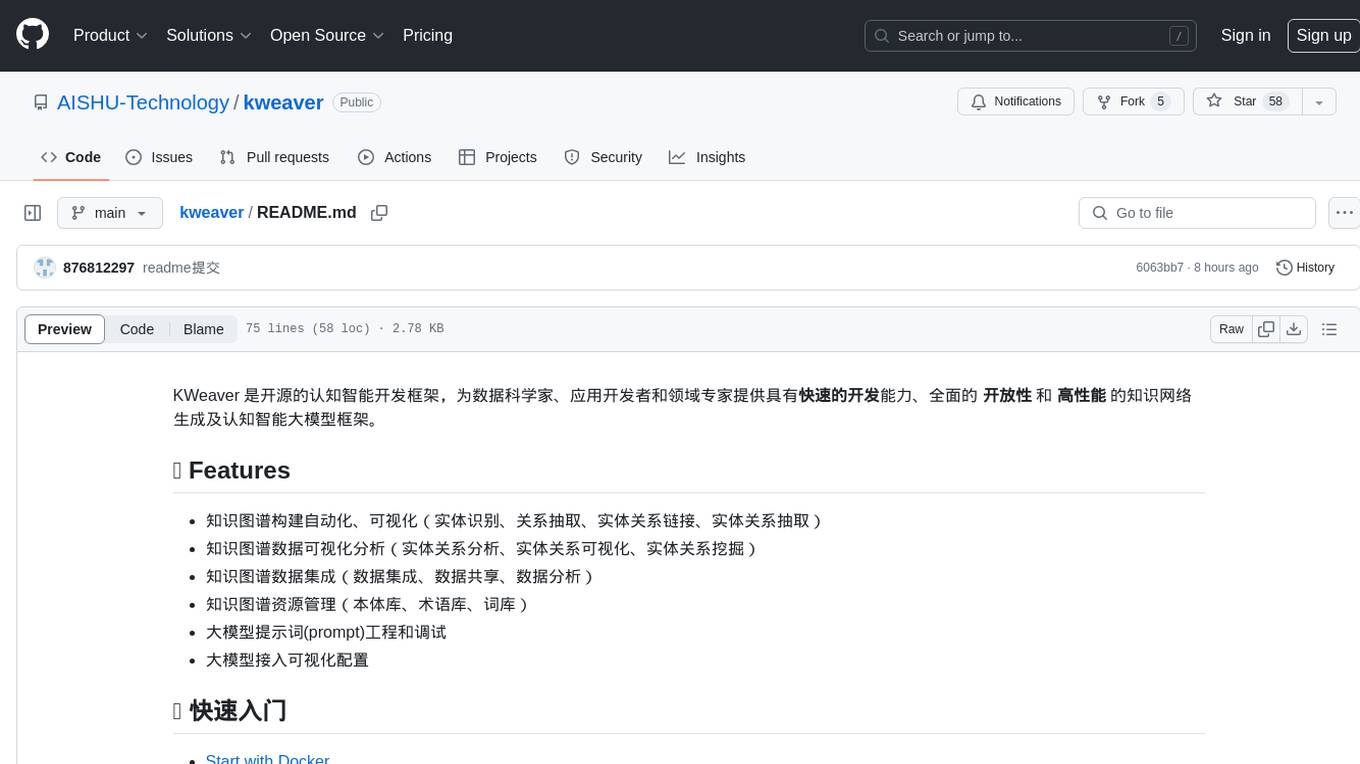
kweaver
KWeaver is an open-source cognitive intelligence development framework that provides data scientists, application developers, and domain experts with the ability for rapid development, comprehensive openness, and high-performance knowledge network generation and cognitive intelligence large model framework. It offers features such as automated and visual knowledge graph construction, visualization and analysis of knowledge graph data, knowledge graph integration, knowledge graph resource management, large model prompt engineering and debugging, and visual configuration for large model access.
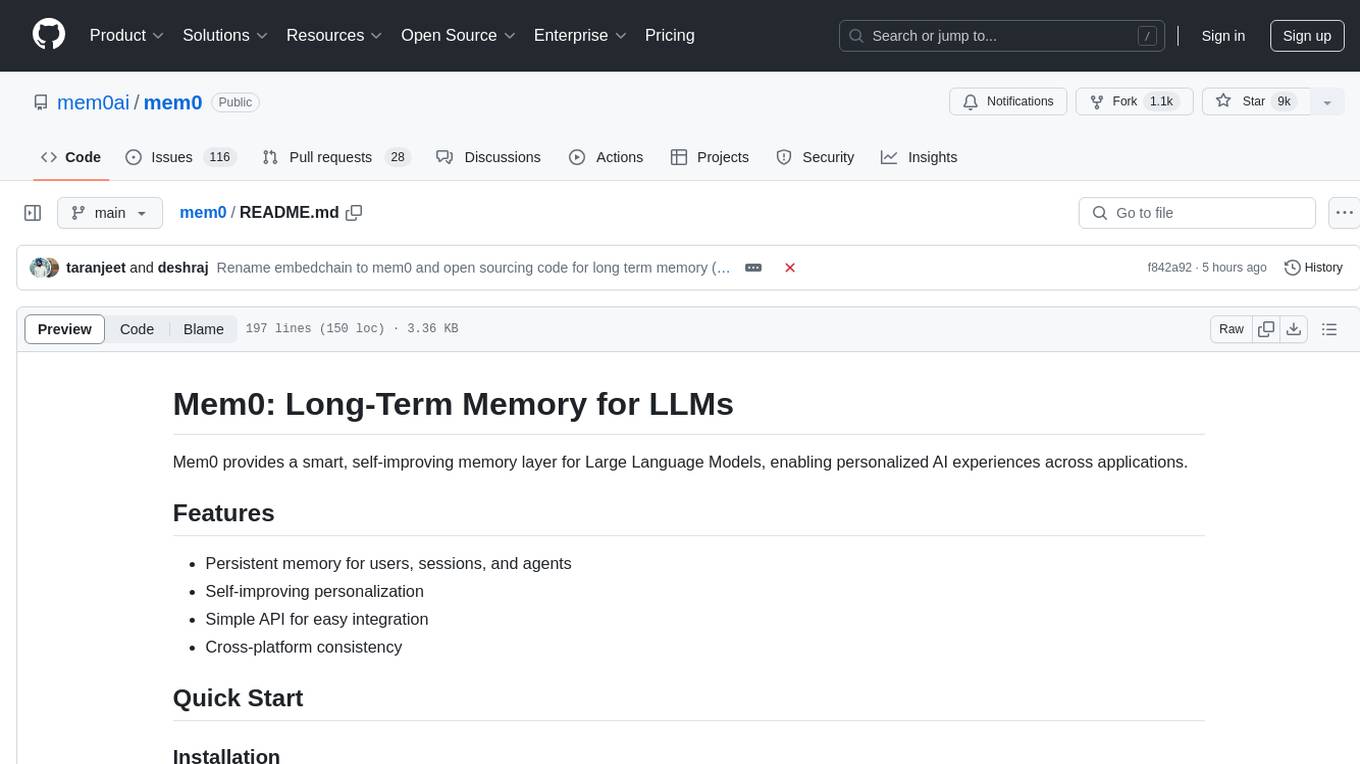
mem0
Mem0 is a tool that provides a smart, self-improving memory layer for Large Language Models, enabling personalized AI experiences across applications. It offers persistent memory for users, sessions, and agents, self-improving personalization, a simple API for easy integration, and cross-platform consistency. Users can store memories, retrieve memories, search for related memories, update memories, get the history of a memory, and delete memories using Mem0. It is designed to enhance AI experiences by enabling long-term memory storage and retrieval.
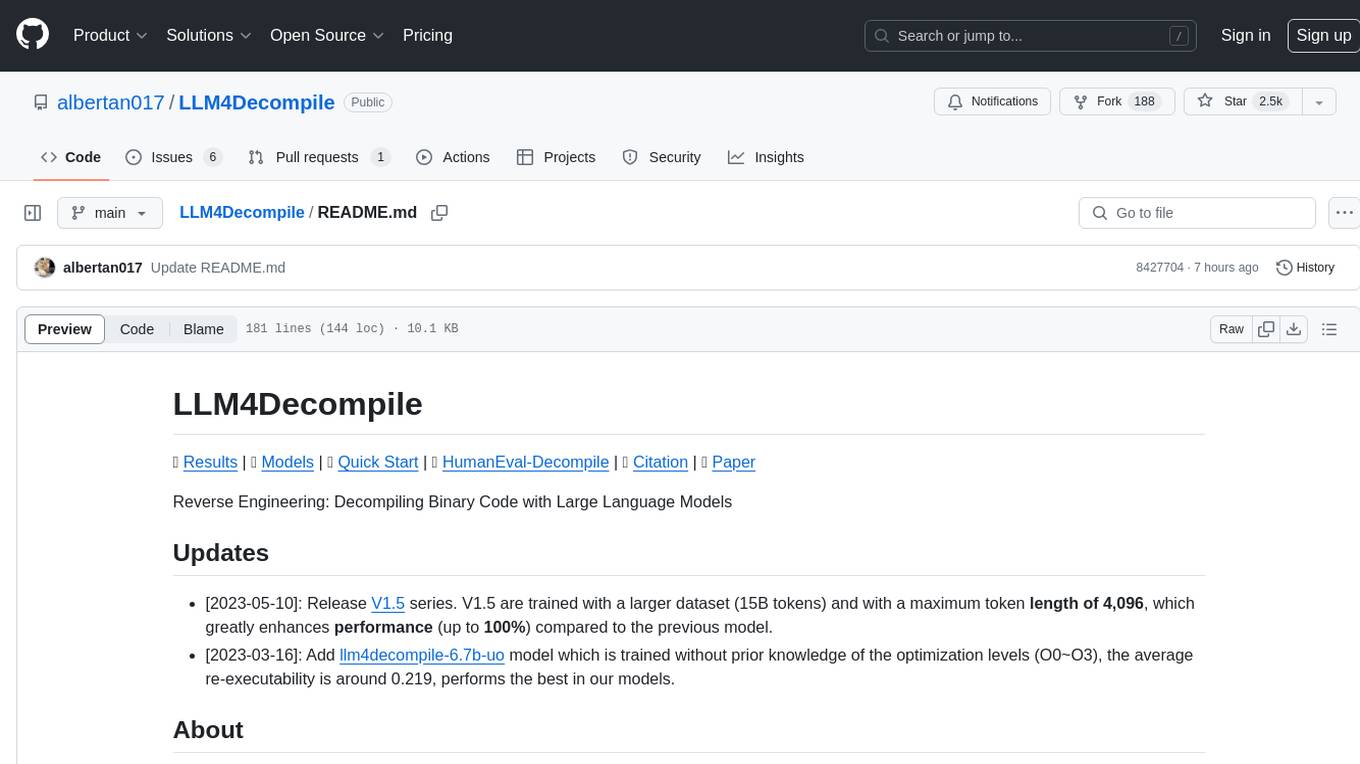
LLM4Decompile
LLM4Decompile is an open-source large language model dedicated to decompilation of Linux x86_64 binaries, supporting GCC's O0 to O3 optimization levels. It focuses on assessing re-executability of decompiled code through HumanEval-Decompile benchmark. The tool includes models with sizes ranging from 1.3 billion to 33 billion parameters, available on Hugging Face. Users can preprocess C code into binary and assembly instructions, then decompile assembly instructions into C using LLM4Decompile. Ongoing efforts aim to expand capabilities to support more architectures and configurations, integrate with decompilation tools like Ghidra and Rizin, and enhance performance with larger training datasets.
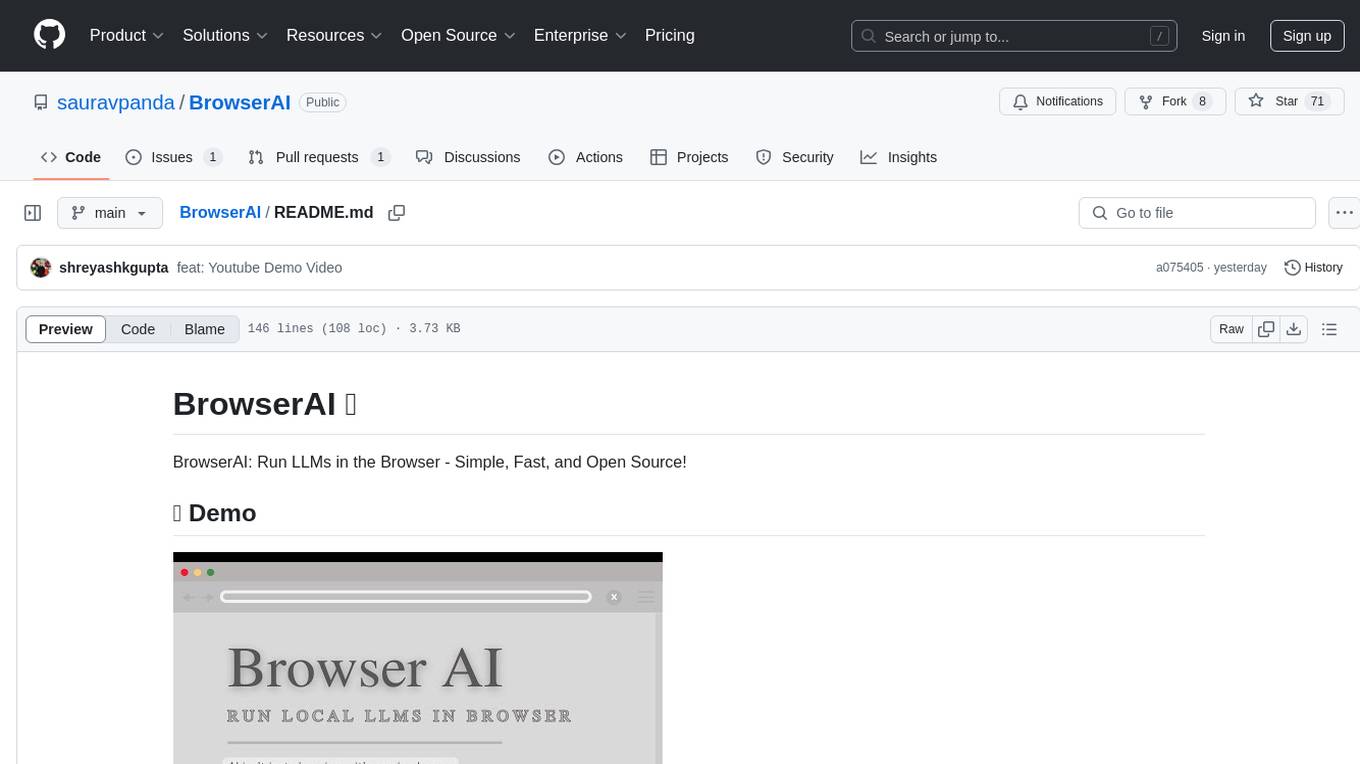
BrowserAI
BrowserAI is a tool that allows users to run large language models (LLMs) directly in the browser, providing a simple, fast, and open-source solution. It prioritizes privacy by processing data locally, is cost-effective with no server costs, works offline after initial download, and offers WebGPU acceleration for high performance. It is developer-friendly with a simple API, supports multiple engines, and comes with pre-configured models for easy use. Ideal for web developers, companies needing privacy-conscious AI solutions, researchers experimenting with browser-based AI, and hobbyists exploring AI without infrastructure overhead.
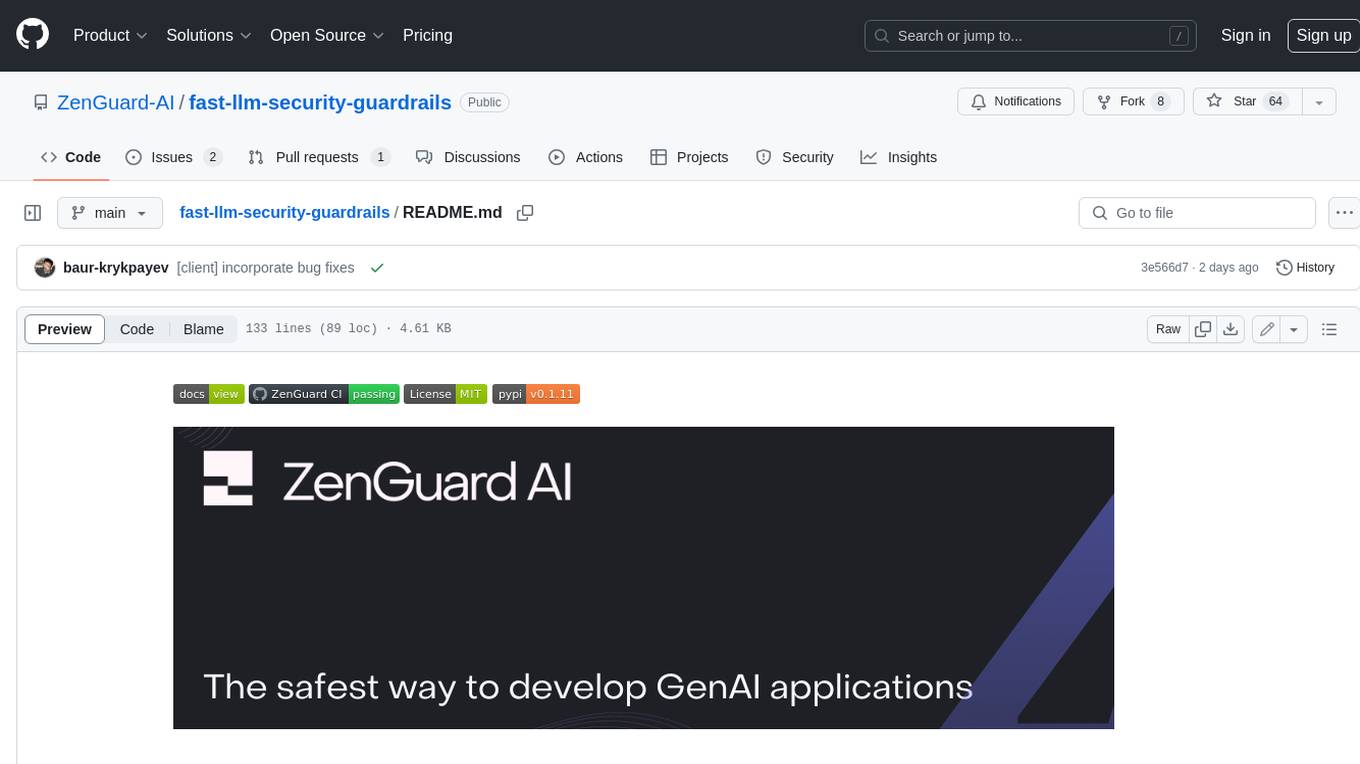
fast-llm-security-guardrails
ZenGuard AI enables AI developers to integrate production-level, low-code LLM (Large Language Model) guardrails into their generative AI applications effortlessly. With ZenGuard AI, ensure your application operates within trusted boundaries, is protected from prompt injections, and maintains user privacy without compromising on performance.
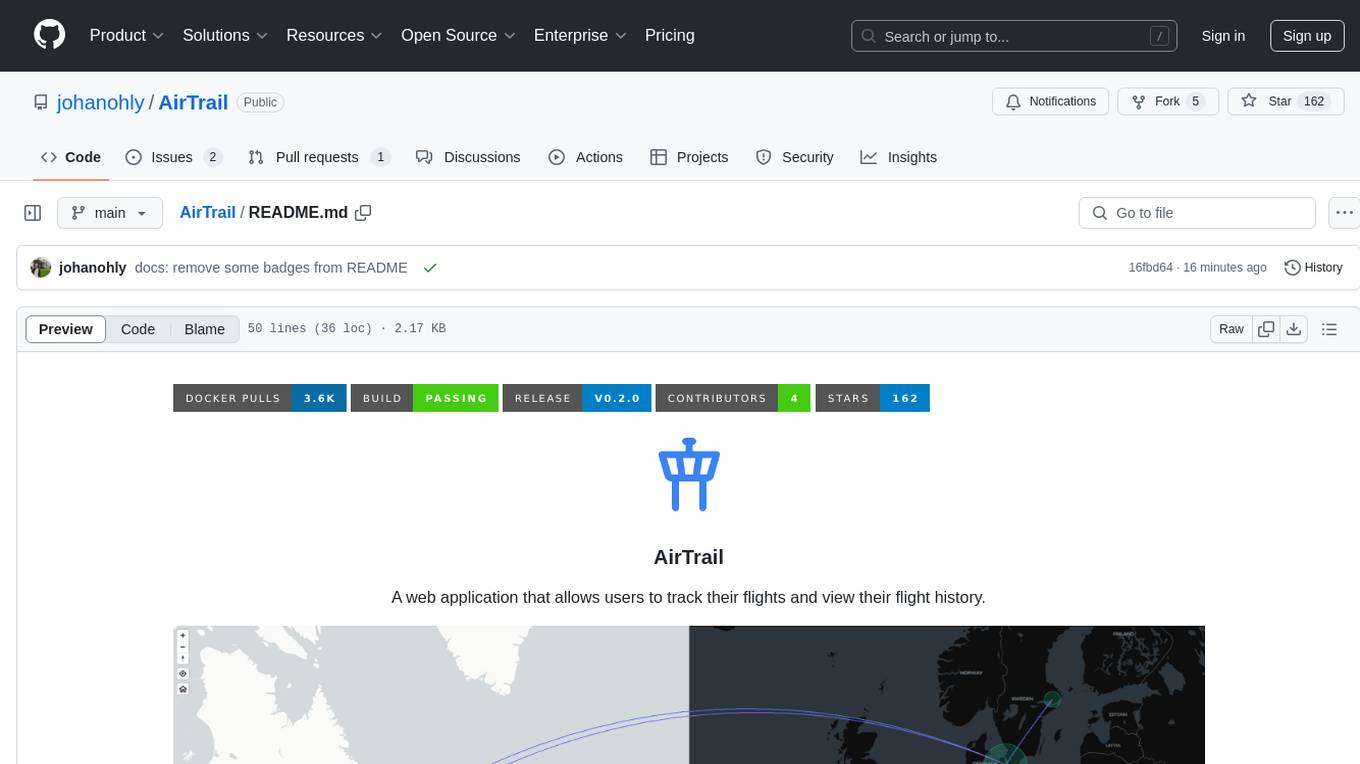
AirTrail
AirTrail is a web application that allows users to track their flights and view their flight history. It features an interactive world map to view flights, flight history tracking, statistics insights, multiple user management with user authentication, responsive design, dark mode, and flight import from various sources.
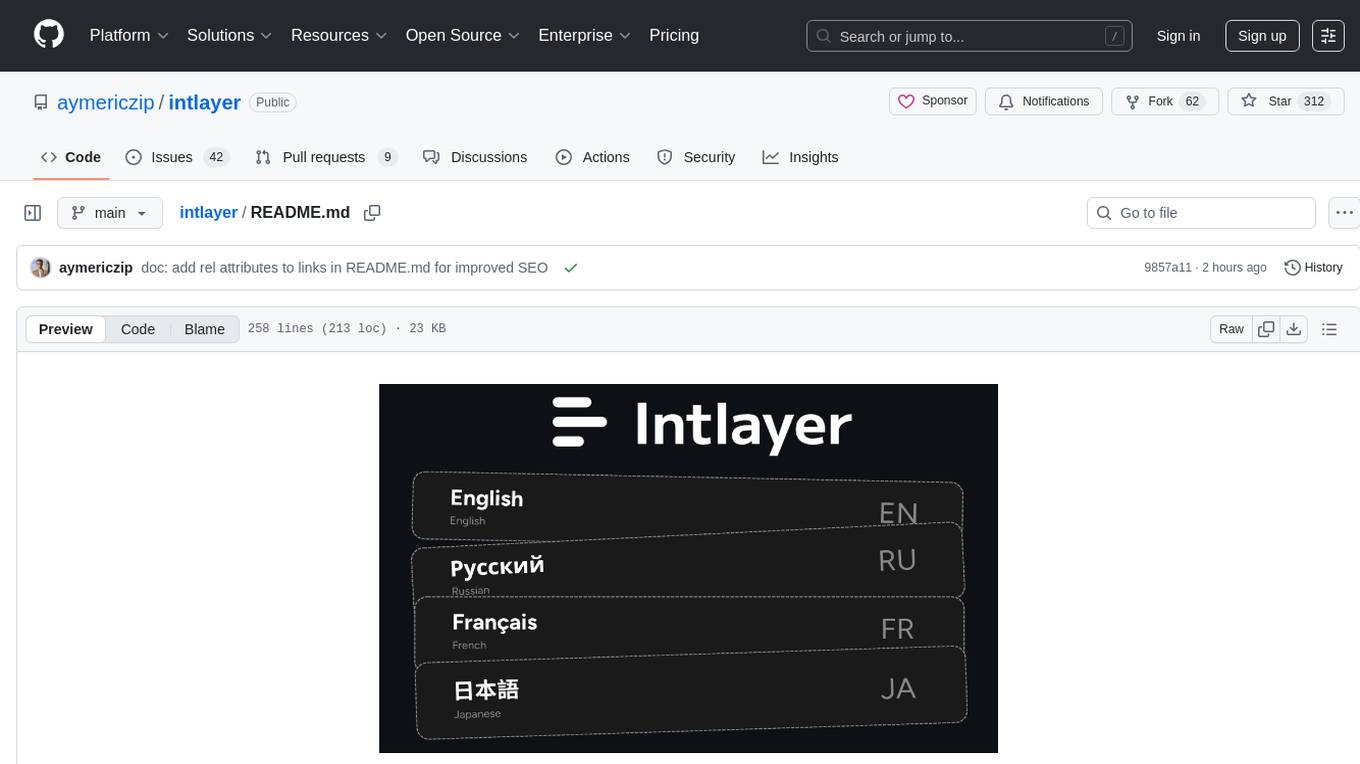
intlayer
Intlayer is an open-source, flexible i18n toolkit with AI-powered translation and CMS capabilities. It is a modern i18n solution for web and mobile apps, framework-agnostic, and includes features like per-locale content files, TypeScript autocompletion, tree-shakable dictionaries, and CI/CD integration. With Intlayer, internationalization becomes faster, cleaner, and smarter, offering benefits such as cross-framework support, JavaScript-powered content management, simplified setup, enhanced routing, AI-powered translation, and more.
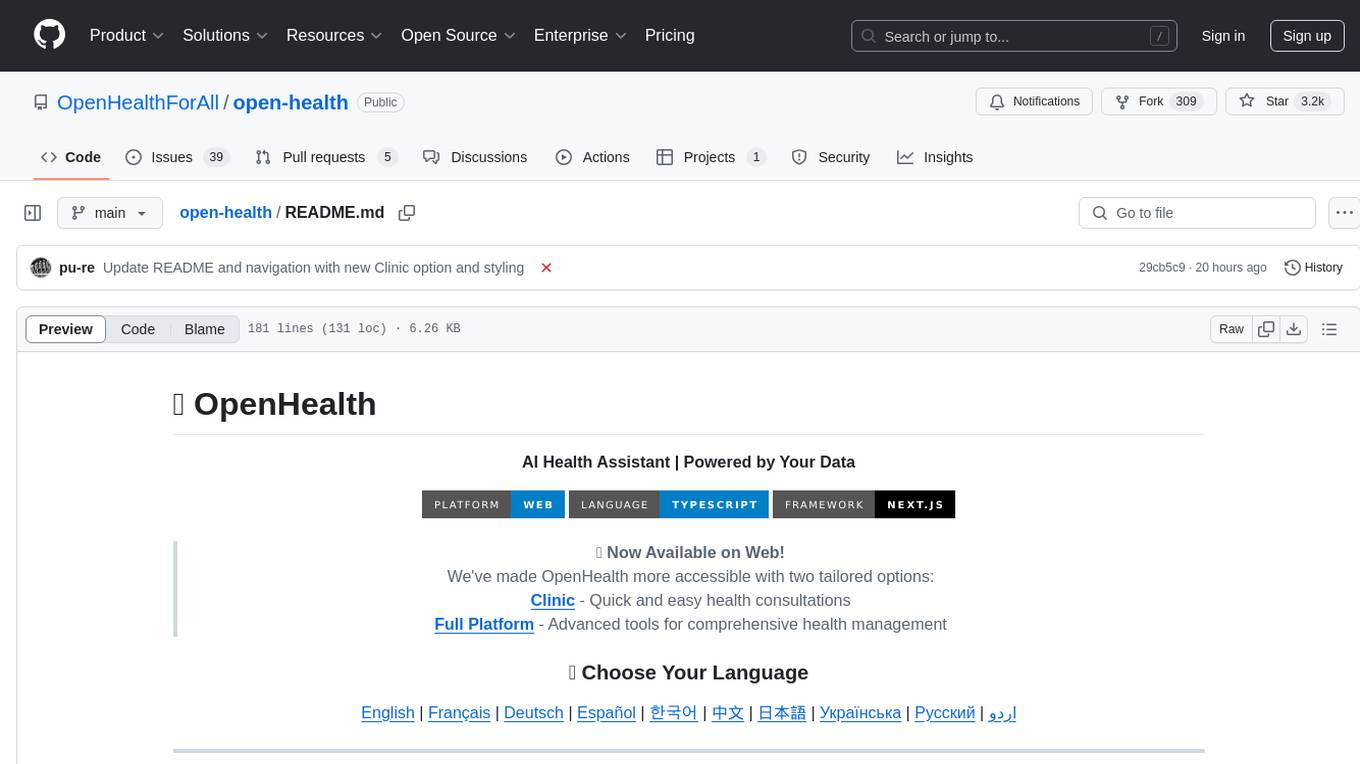
open-health
OpenHealth is an AI health assistant that helps users manage their health data by leveraging AI and personal health information. It allows users to consolidate health data, parse it smartly, and engage in contextual conversations with GPT-powered AI. The tool supports various data sources like blood test results, health checkup data, personal physical information, family history, and symptoms. OpenHealth aims to empower users to take control of their health by combining data and intelligence for actionable health management.
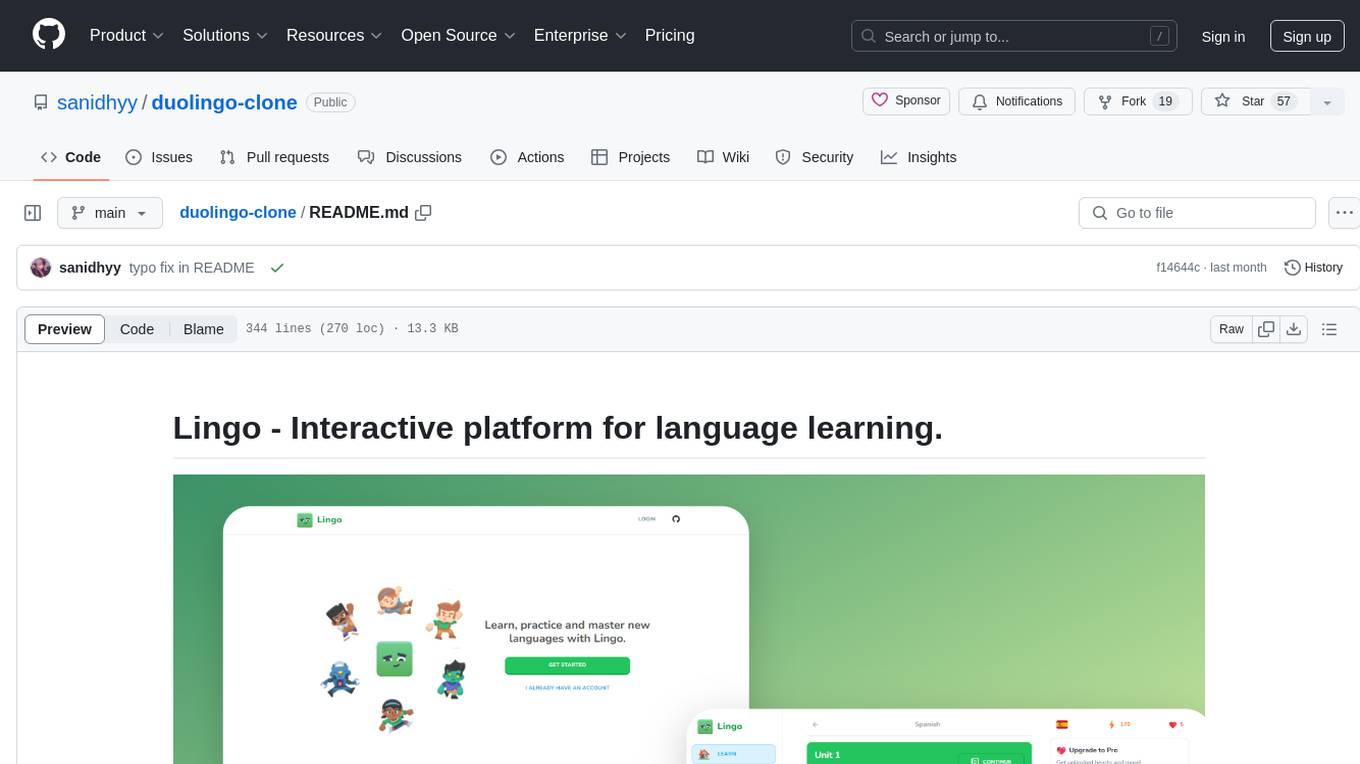
duolingo-clone
Lingo is an interactive platform for language learning that provides a modern UI/UX experience. It offers features like courses, quests, and a shop for users to engage with. The tech stack includes React JS, Next JS, Typescript, Tailwind CSS, Vercel, and Postgresql. Users can contribute to the project by submitting changes via pull requests. The platform utilizes resources from CodeWithAntonio, Kenney Assets, Freesound, Elevenlabs AI, and Flagpack. Key dependencies include @clerk/nextjs, @neondatabase/serverless, @radix-ui/react-avatar, and more. Users can follow the project creator on GitHub and Twitter, as well as subscribe to their YouTube channel for updates. To learn more about Next.js, users can refer to the Next.js documentation and interactive tutorial.
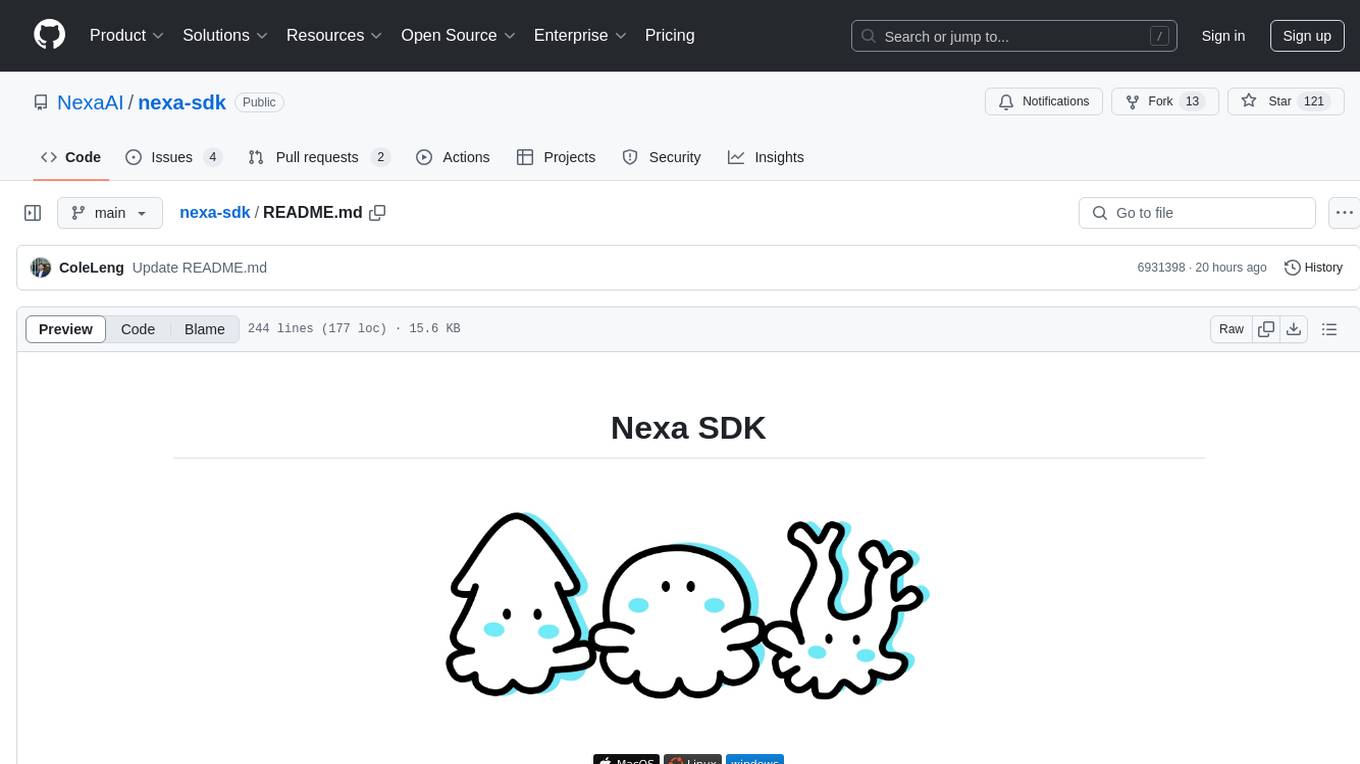
nexa-sdk
Nexa SDK is a comprehensive toolkit supporting ONNX and GGML models for text generation, image generation, vision-language models (VLM), and text-to-speech (TTS) capabilities. It offers an OpenAI-compatible API server with JSON schema mode and streaming support, along with a user-friendly Streamlit UI. Users can run Nexa SDK on any device with Python environment, with GPU acceleration supported. The toolkit provides model support, conversion engine, inference engine for various tasks, and differentiating features from other tools.
For similar tasks
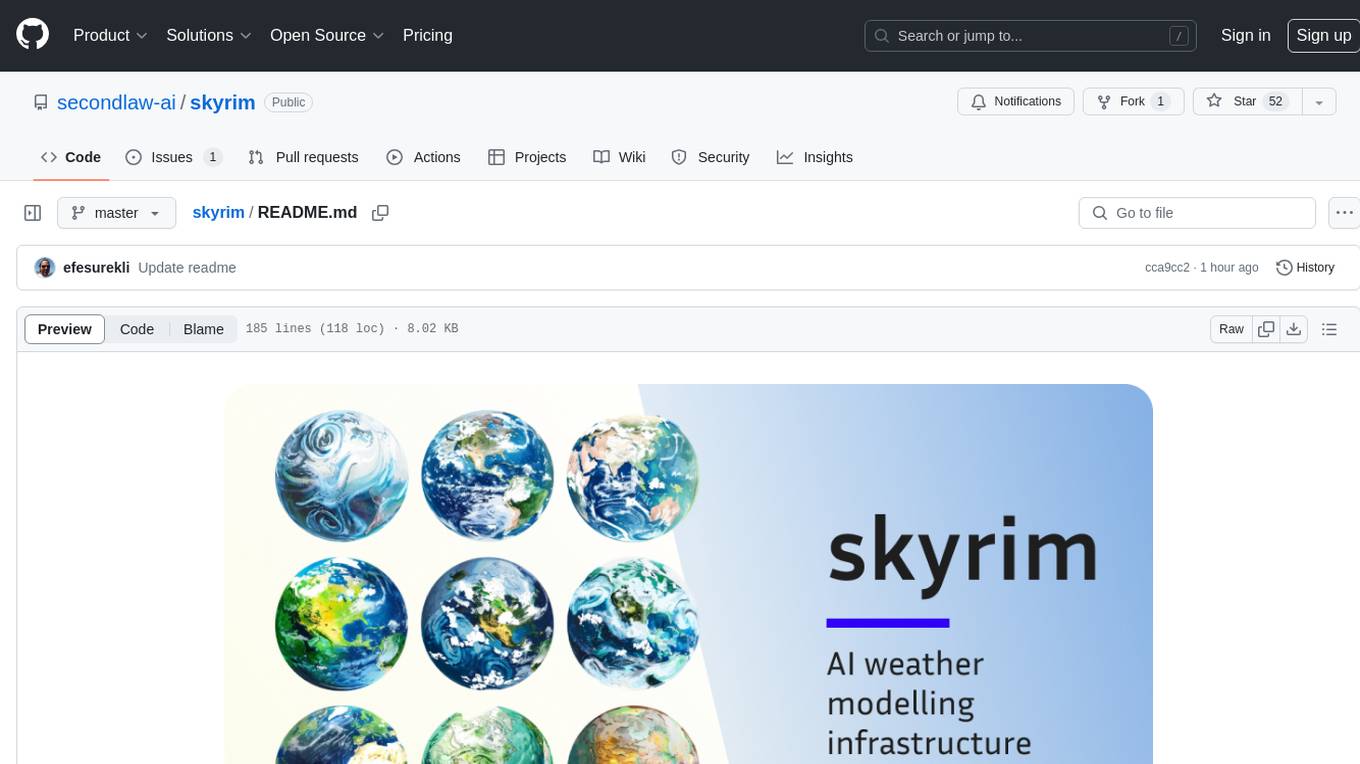
skyrim
Skyrim is a weather forecasting tool that enables users to run large weather models using consumer-grade GPUs. It provides access to state-of-the-art foundational weather models through a well-maintained infrastructure. Users can forecast weather conditions, such as wind speed and direction, by running simulations on their own GPUs or using modal volume or cloud services like s3 buckets. Skyrim supports various large weather models like Graphcast, Pangu, Fourcastnet, and DLWP, with plans for future enhancements like ensemble prediction and model quantization.
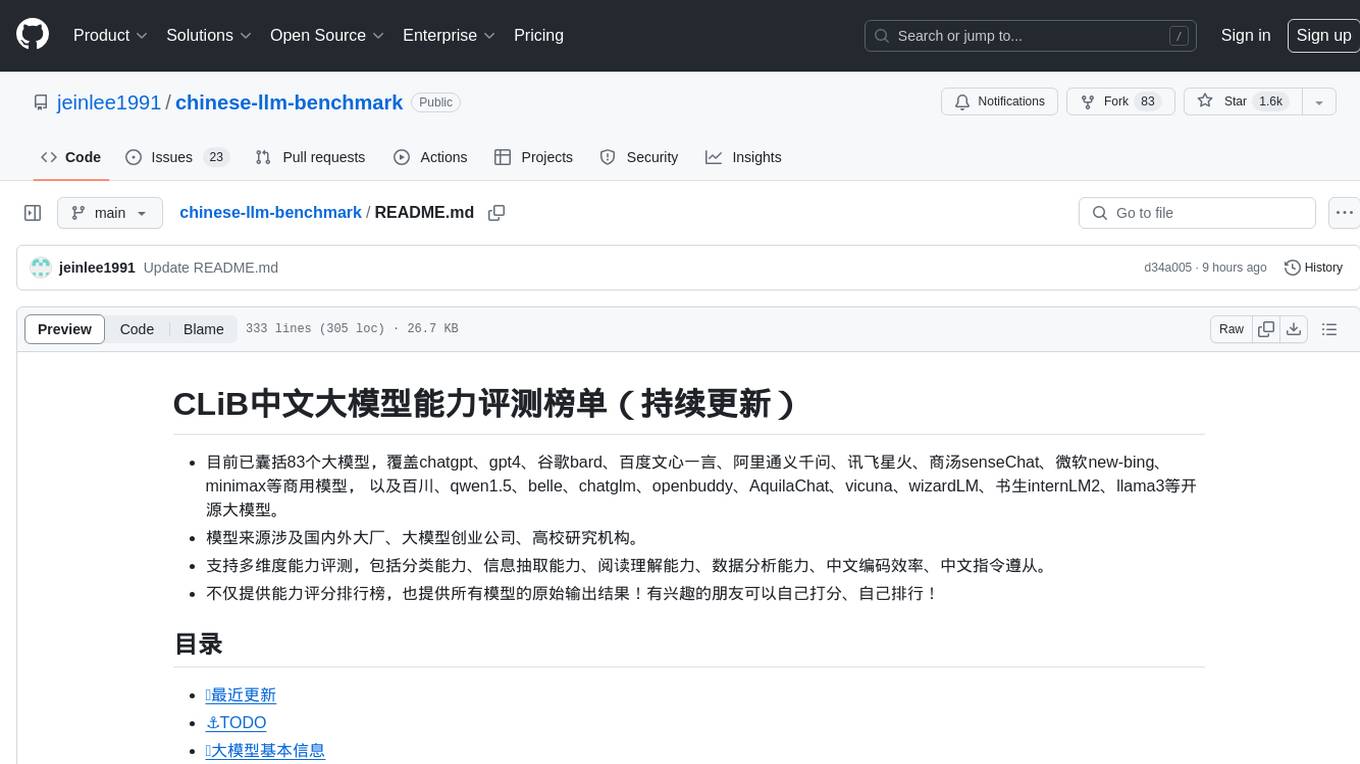
chinese-llm-benchmark
The Chinese LLM Benchmark is a continuous evaluation list of large models in CLiB, covering a wide range of commercial and open-source models from various companies and research institutions. It supports multidimensional evaluation of capabilities including classification, information extraction, reading comprehension, data analysis, Chinese encoding efficiency, and Chinese instruction compliance. The benchmark not only provides capability score rankings but also offers the original output results of all models for interested individuals to score and rank themselves.
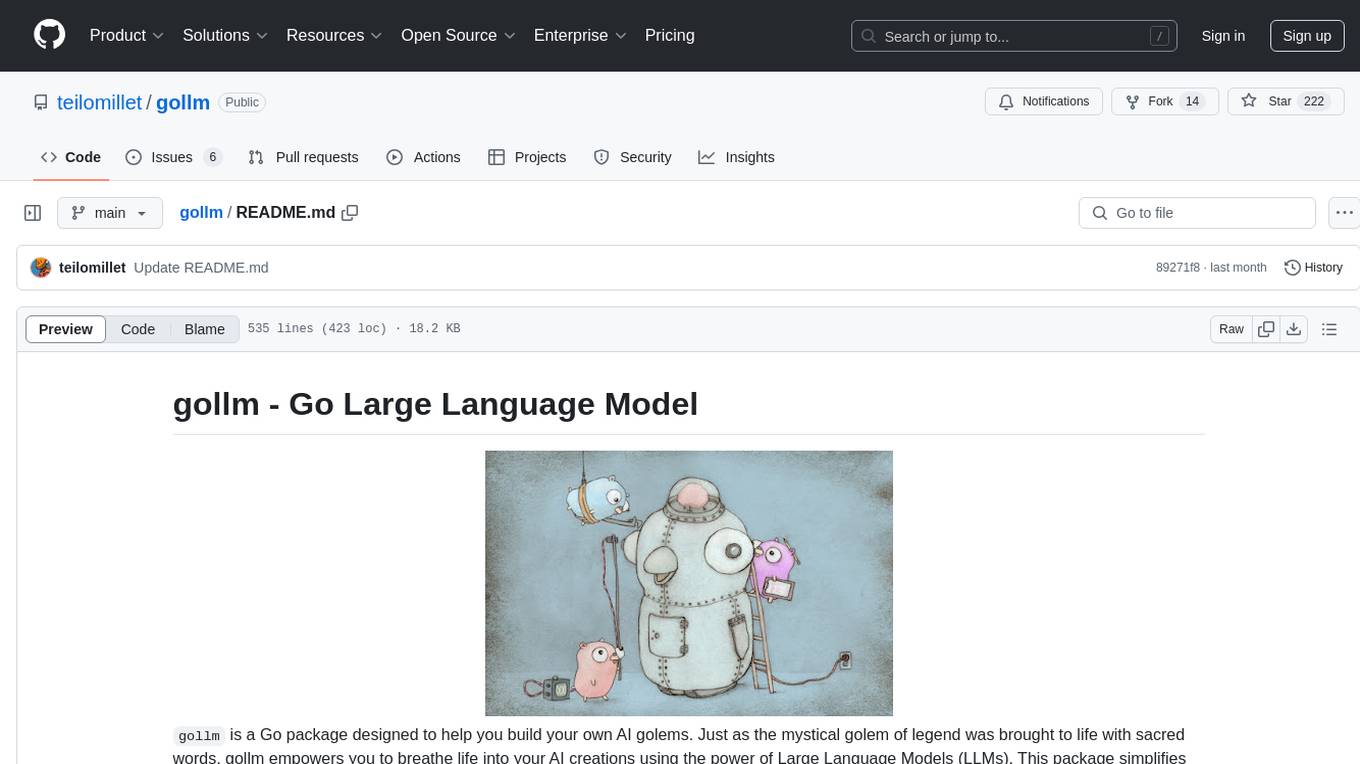
gollm
gollm is a Go package designed to simplify interactions with Large Language Models (LLMs) for AI engineers and developers. It offers a unified API for multiple LLM providers, easy provider and model switching, flexible configuration options, advanced prompt engineering, prompt optimization, memory retention, structured output and validation, provider comparison tools, high-level AI functions, robust error handling and retries, and extensible architecture. The package enables users to create AI-powered golems for tasks like content creation workflows, complex reasoning tasks, structured data generation, model performance analysis, prompt optimization, and creating a mixture of agents.

LMeterX
LMeterX is a professional large language model performance testing platform that supports model inference services based on large model inference frameworks and cloud services. It provides an intuitive Web interface for creating and managing test tasks, monitoring testing processes, and obtaining detailed performance analysis reports to support model deployment and optimization.

BentoML
BentoML is an open-source model serving library for building performant and scalable AI applications with Python. It comes with everything you need for serving optimization, model packaging, and production deployment.
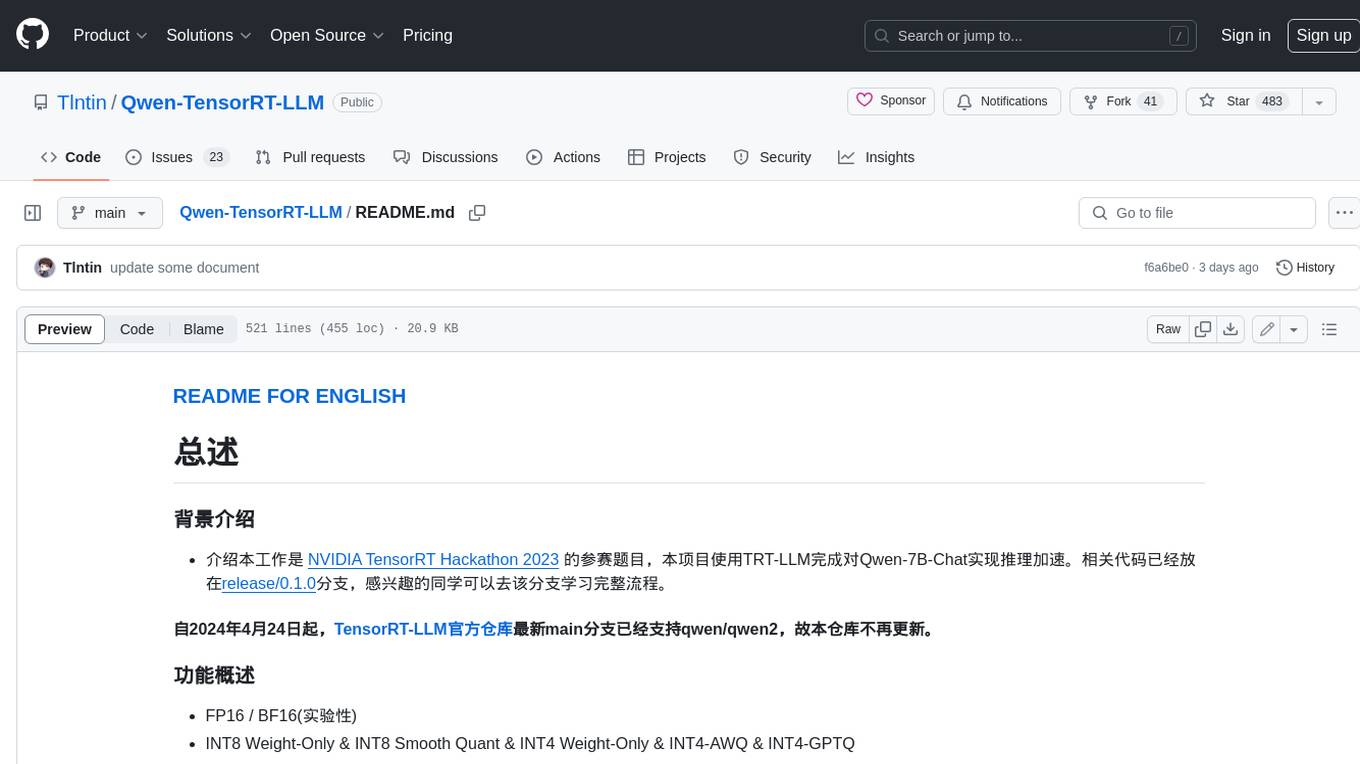
Qwen-TensorRT-LLM
Qwen-TensorRT-LLM is a project developed for the NVIDIA TensorRT Hackathon 2023, focusing on accelerating inference for the Qwen-7B-Chat model using TRT-LLM. The project offers various functionalities such as FP16/BF16 support, INT8 and INT4 quantization options, Tensor Parallel for multi-GPU parallelism, web demo setup with gradio, Triton API deployment for maximum throughput/concurrency, fastapi integration for openai requests, CLI interaction, and langchain support. It supports models like qwen2, qwen, and qwen-vl for both base and chat models. The project also provides tutorials on Bilibili and blogs for adapting Qwen models in NVIDIA TensorRT-LLM, along with hardware requirements and quick start guides for different model types and quantization methods.
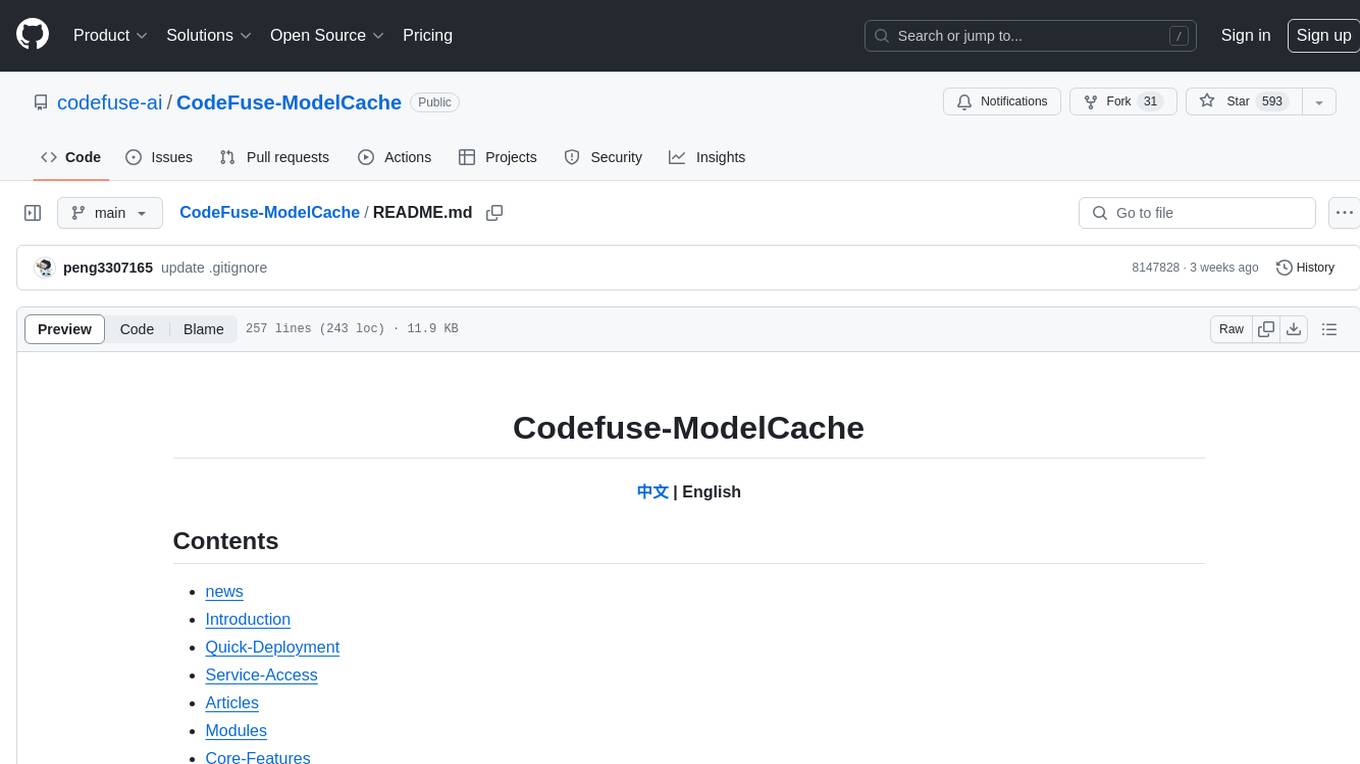
CodeFuse-ModelCache
Codefuse-ModelCache is a semantic cache for large language models (LLMs) that aims to optimize services by introducing a caching mechanism. It helps reduce the cost of inference deployment, improve model performance and efficiency, and provide scalable services for large models. The project caches pre-generated model results to reduce response time for similar requests and enhance user experience. It integrates various embedding frameworks and local storage options, offering functionalities like cache-writing, cache-querying, and cache-clearing through RESTful API. The tool supports multi-tenancy, system commands, and multi-turn dialogue, with features for data isolation, database management, and model loading schemes. Future developments include data isolation based on hyperparameters, enhanced system prompt partitioning storage, and more versatile embedding models and similarity evaluation algorithms.
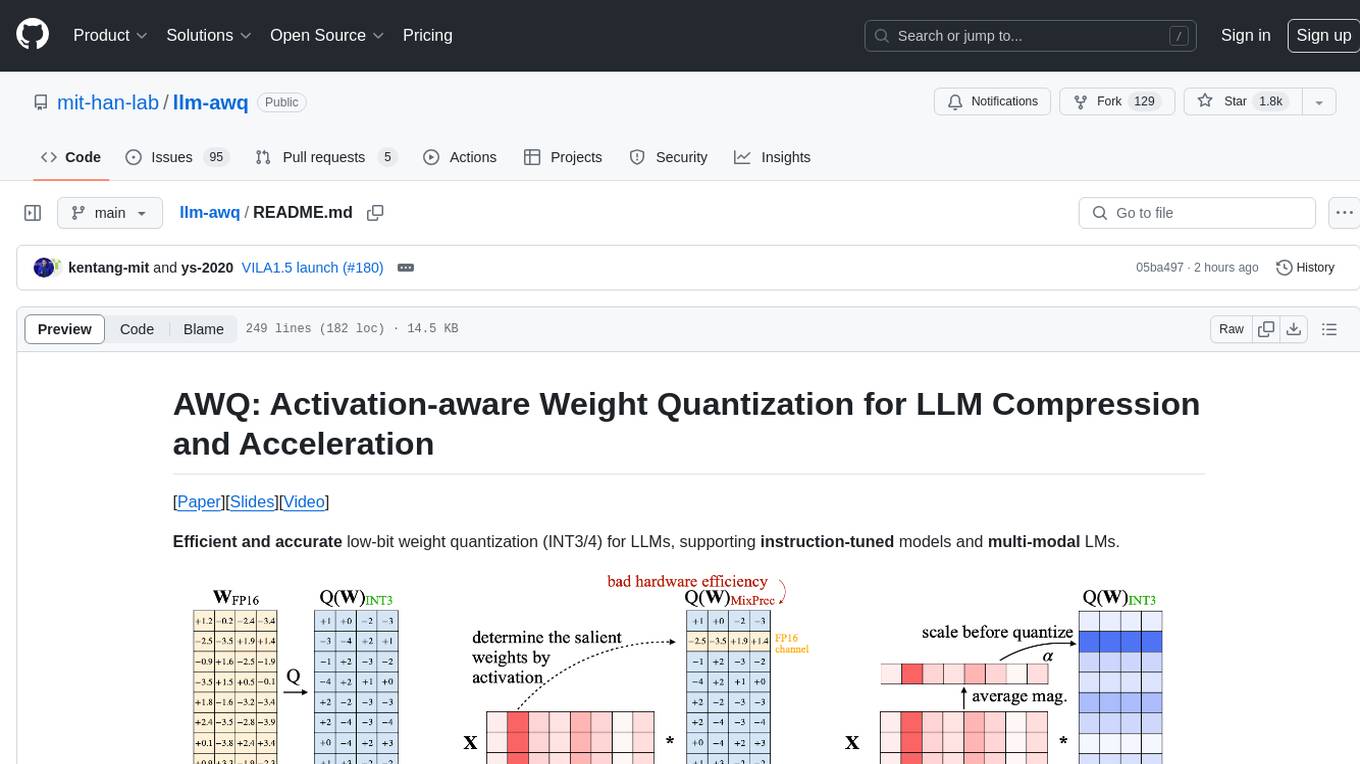
llm-awq
AWQ (Activation-aware Weight Quantization) is a tool designed for efficient and accurate low-bit weight quantization (INT3/4) for Large Language Models (LLMs). It supports instruction-tuned models and multi-modal LMs, providing features such as AWQ search for accurate quantization, pre-computed AWQ model zoo for various LLMs, memory-efficient 4-bit linear in PyTorch, and efficient CUDA kernel implementation for fast inference. The tool enables users to run large models on resource-constrained edge platforms, delivering more efficient responses with LLM/VLM chatbots through 4-bit inference.
For similar jobs
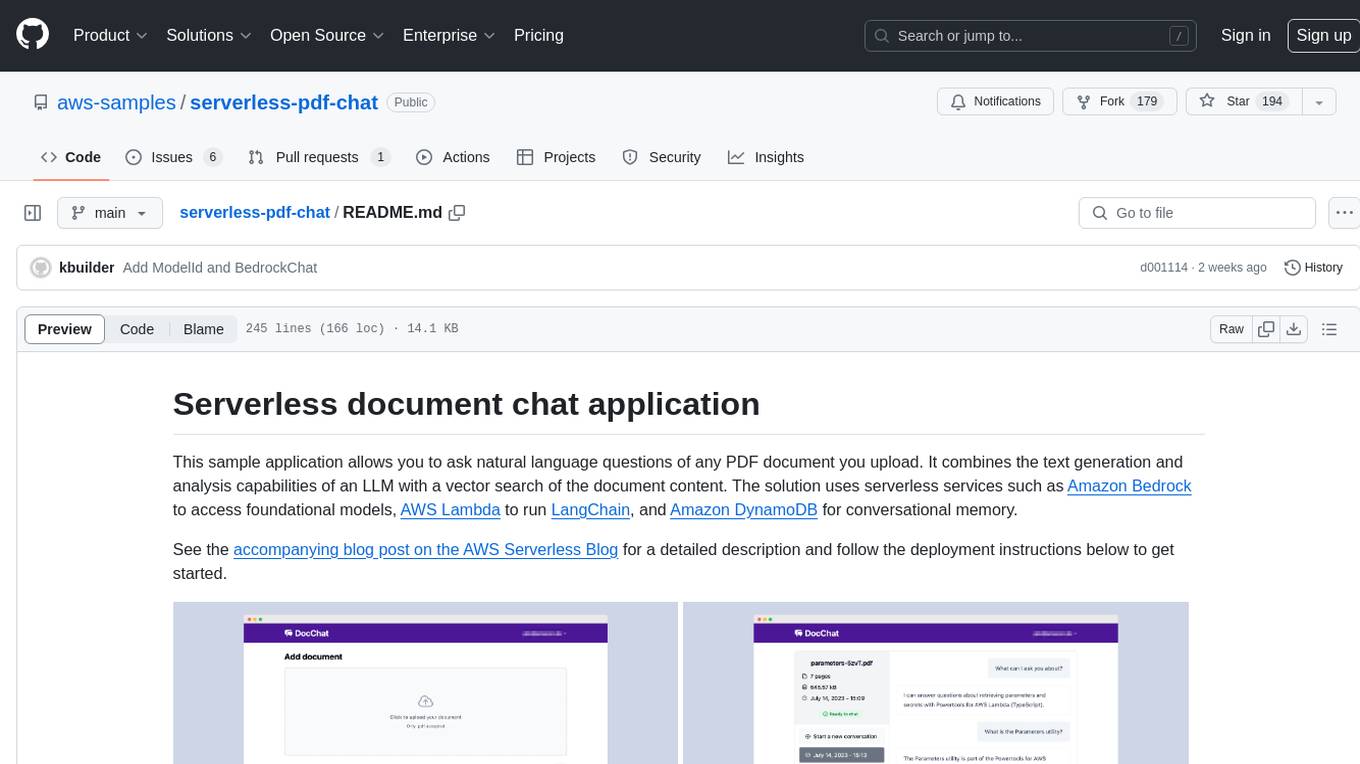
serverless-pdf-chat
The serverless-pdf-chat repository contains a sample application that allows users to ask natural language questions of any PDF document they upload. It leverages serverless services like Amazon Bedrock, AWS Lambda, and Amazon DynamoDB to provide text generation and analysis capabilities. The application architecture involves uploading a PDF document to an S3 bucket, extracting metadata, converting text to vectors, and using a LangChain to search for information related to user prompts. The application is not intended for production use and serves as a demonstration and educational tool.
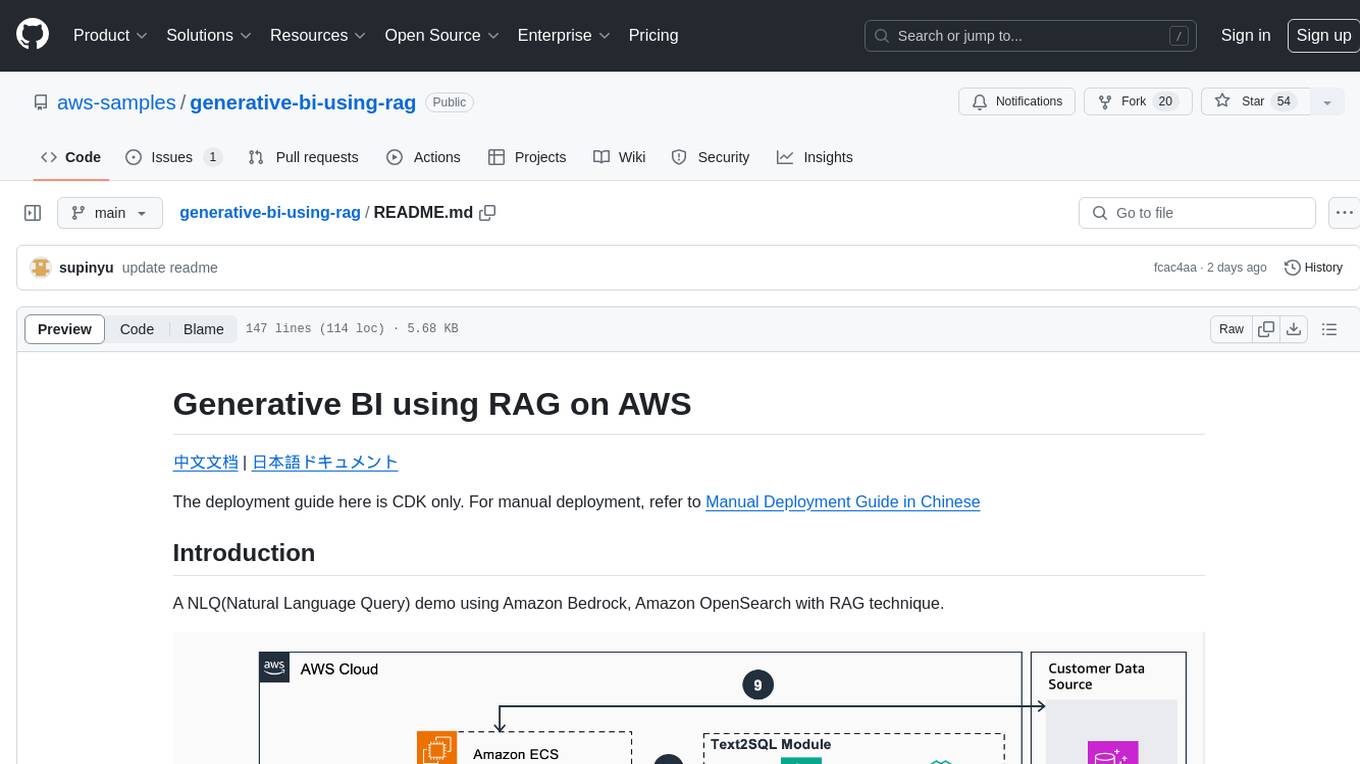
generative-bi-using-rag
Generative BI using RAG on AWS is a comprehensive framework designed to enable Generative BI capabilities on customized data sources hosted on AWS. It offers features such as Text-to-SQL functionality for querying data sources using natural language, user-friendly interface for managing data sources, performance enhancement through historical question-answer ranking, and entity recognition. It also allows customization of business information, handling complex attribution analysis problems, and provides an intuitive question-answering UI with a conversational approach for complex queries.
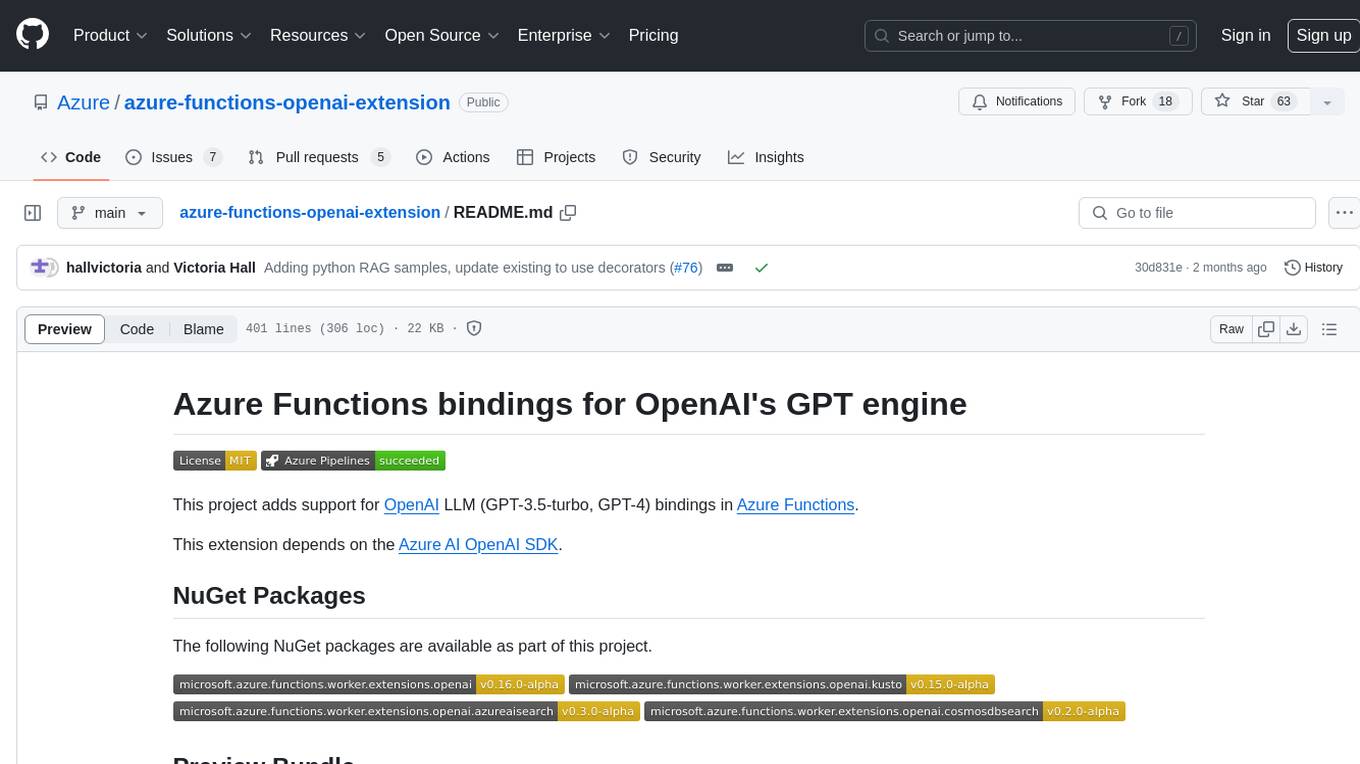
azure-functions-openai-extension
Azure Functions OpenAI Extension is a project that adds support for OpenAI LLM (GPT-3.5-turbo, GPT-4) bindings in Azure Functions. It provides NuGet packages for various functionalities like text completions, chat completions, assistants, embeddings generators, and semantic search. The project requires .NET 6 SDK or greater, Azure Functions Core Tools v4.x, and specific settings in Azure Function or local settings for development. It offers features like text completions, chat completion, assistants with custom skills, embeddings generators for text relatedness, and semantic search using vector databases. The project also includes examples in C# and Python for different functionalities.
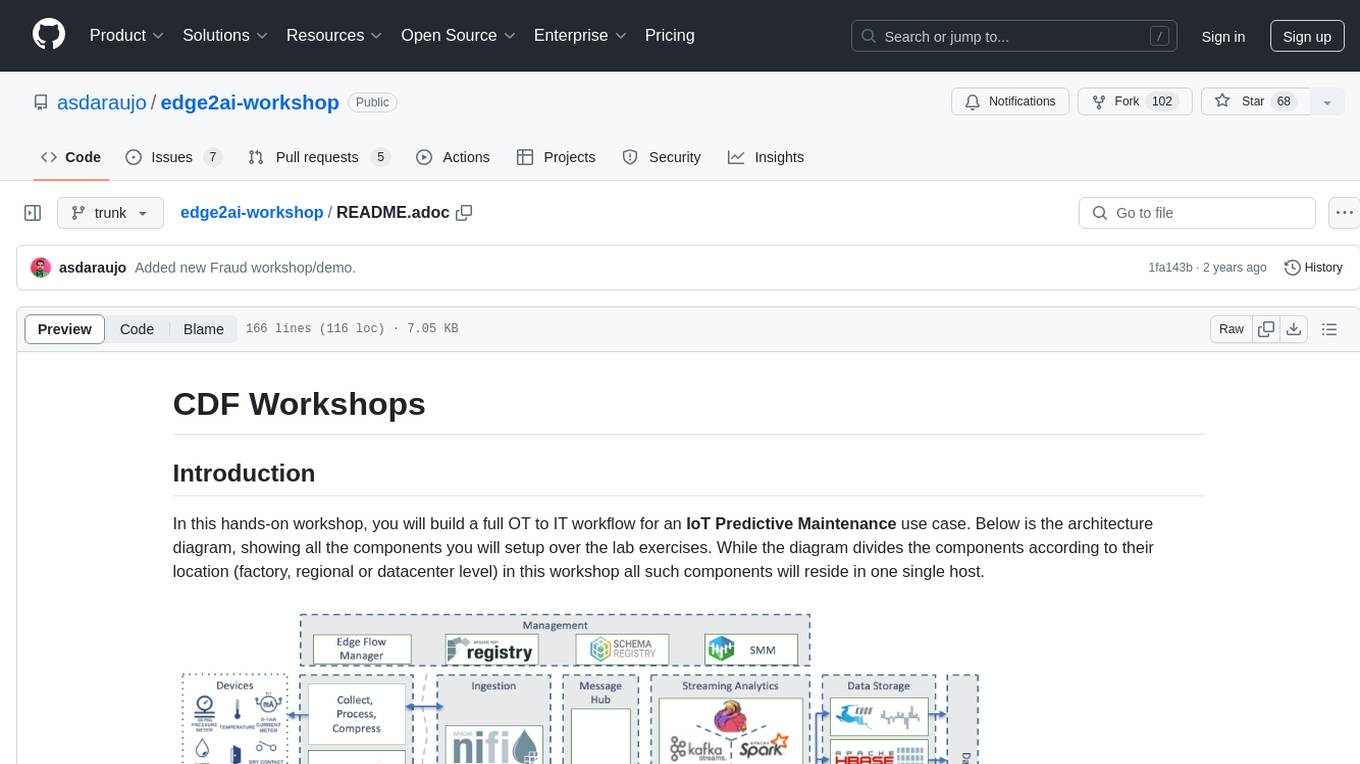
edge2ai-workshop
The edge2ai-workshop repository provides a hands-on workshop for building an IoT Predictive Maintenance workflow. It includes lab exercises for setting up components like NiFi, Streams Processing, Data Visualization, and more on a single host. The repository also covers use cases such as credit card fraud detection. Users can follow detailed instructions, prerequisites, and connectivity guidelines to connect to their cluster and explore various services. Additionally, troubleshooting tips are provided for common issues like MiNiFi not sending messages or CEM not picking up new NARs.
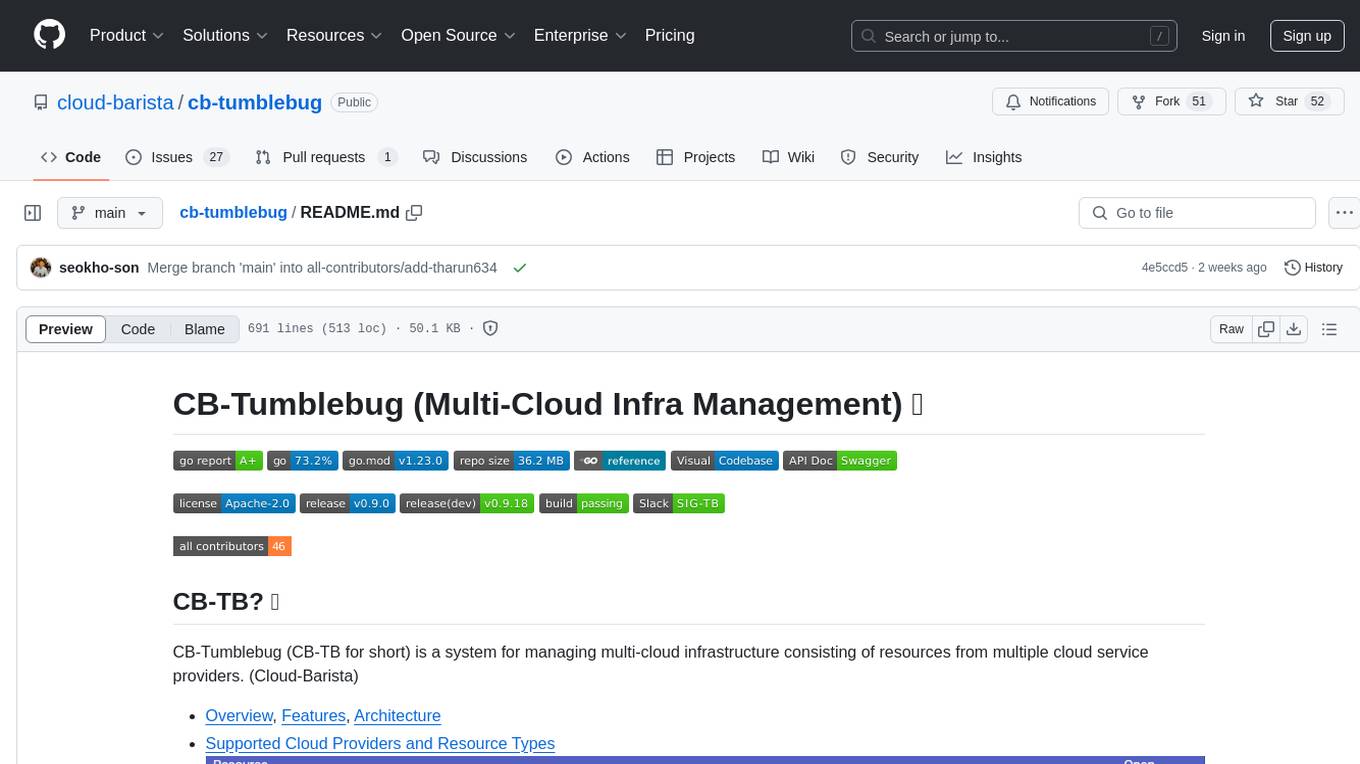
cb-tumblebug
CB-Tumblebug (CB-TB) is a system for managing multi-cloud infrastructure consisting of resources from multiple cloud service providers. It provides an overview, features, and architecture. The tool supports various cloud providers and resource types, with ongoing development and localization efforts. Users can deploy a multi-cloud infra with GPUs, enjoy multiple LLMs in parallel, and utilize LLM-related scripts. The tool requires Linux, Docker, Docker Compose, and Golang for building the source. Users can run CB-TB with Docker Compose or from the Makefile, set up prerequisites, contribute to the project, and view a list of contributors. The tool is licensed under an open-source license.
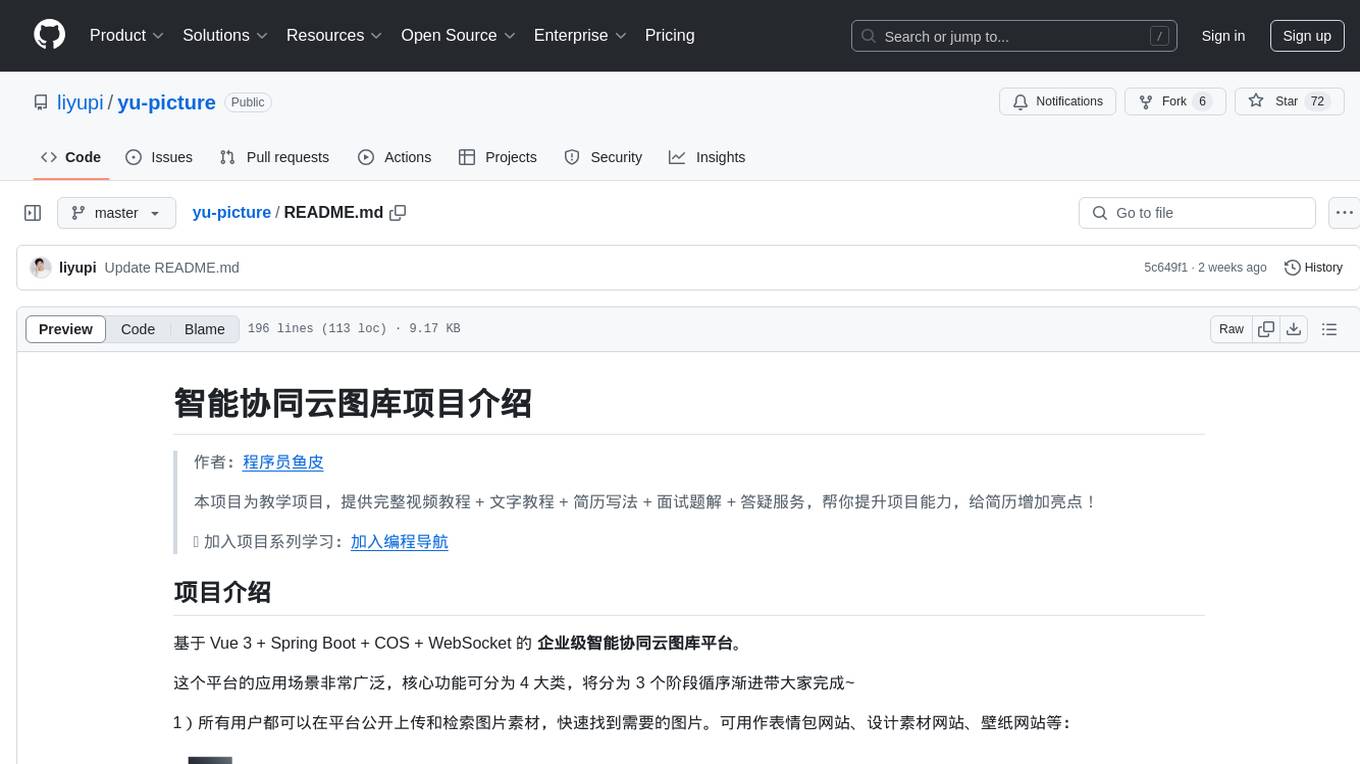
yu-picture
The 'yu-picture' project is an educational project that provides complete video tutorials, text tutorials, resume writing, interview question solutions, and Q&A services to help you improve your project skills and enhance your resume. It is an enterprise-level intelligent collaborative cloud image library platform based on Vue 3 + Spring Boot + COS + WebSocket. The platform has a wide range of applications, including public image uploading and retrieval, image analysis for administrators, private image management for individual users, and real-time collaborative image editing for enterprises. The project covers file management, content retrieval, permission control, and real-time collaboration, using various programming concepts, architectural design methods, and optimization strategies to ensure high-speed iteration and stable operation.
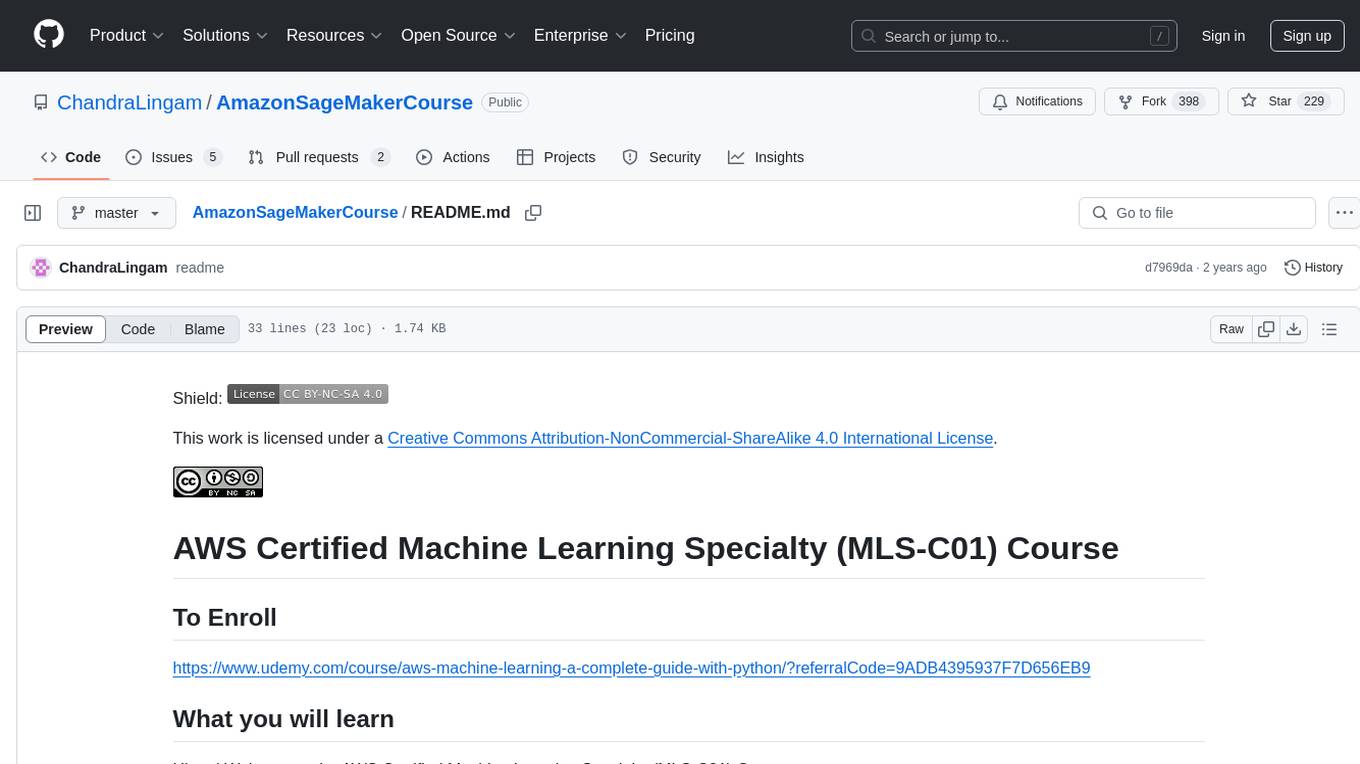
AmazonSageMakerCourse
Amazon SageMaker Course is a comprehensive guide for AWS Certified Machine Learning Specialty (MLS-C01) that covers training, optimizing, deploying, and integrating machine learning models in the AWS cloud. The course includes hands-on experience with AWS built-in algorithms, Bring Your Own models, and ready-to-use AI capabilities. It also provides a complete guide to AWS Certified Machine Learning – Specialty certification, along with a high-quality timed practice test. Participants will learn how to integrate trained models into their applications and receive prompt support through the course Q&A forum and private messaging.
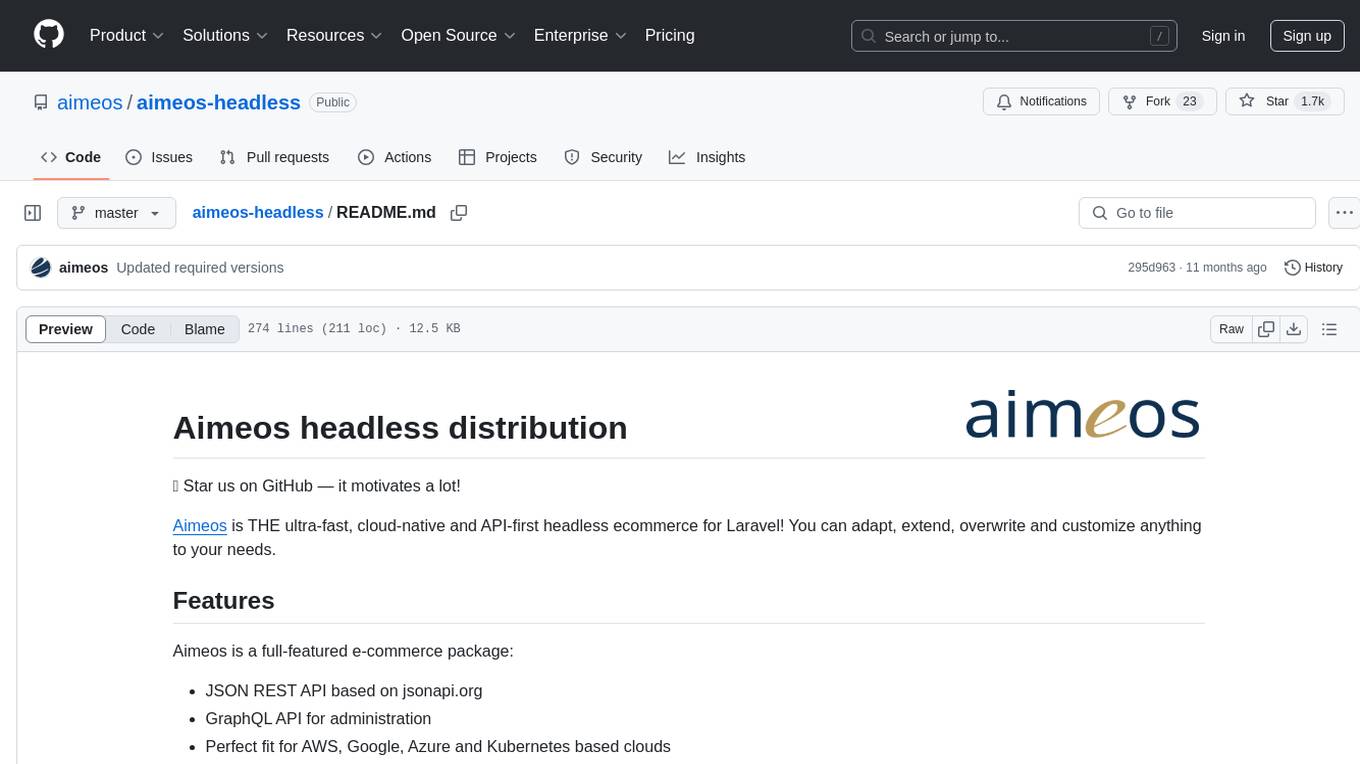
aimeos-headless
Aimeos headless distribution is an ultra-fast, cloud-native, and API-first headless ecommerce solution for Laravel. It offers a full-featured e-commerce package with features like JSON REST API, GraphQL API, multi-vendor support, subscriptions, block/tier pricing, admin backend, and more. The distribution is highly customizable, extensible, and suitable for multi-tenant e-commerce SaaS solutions. It supports multiple languages, AI-based text translation, and provides secure and high-quality source code. Aimeos is designed for AWS, Google, Azure, and Kubernetes based clouds, and can handle a wide range of products efficiently.







